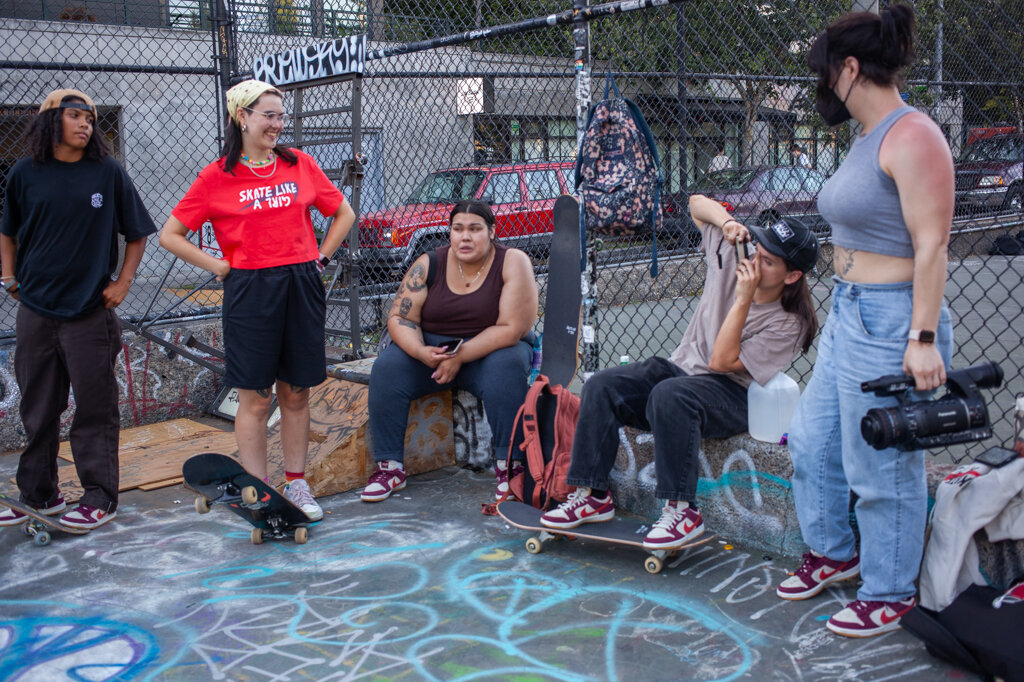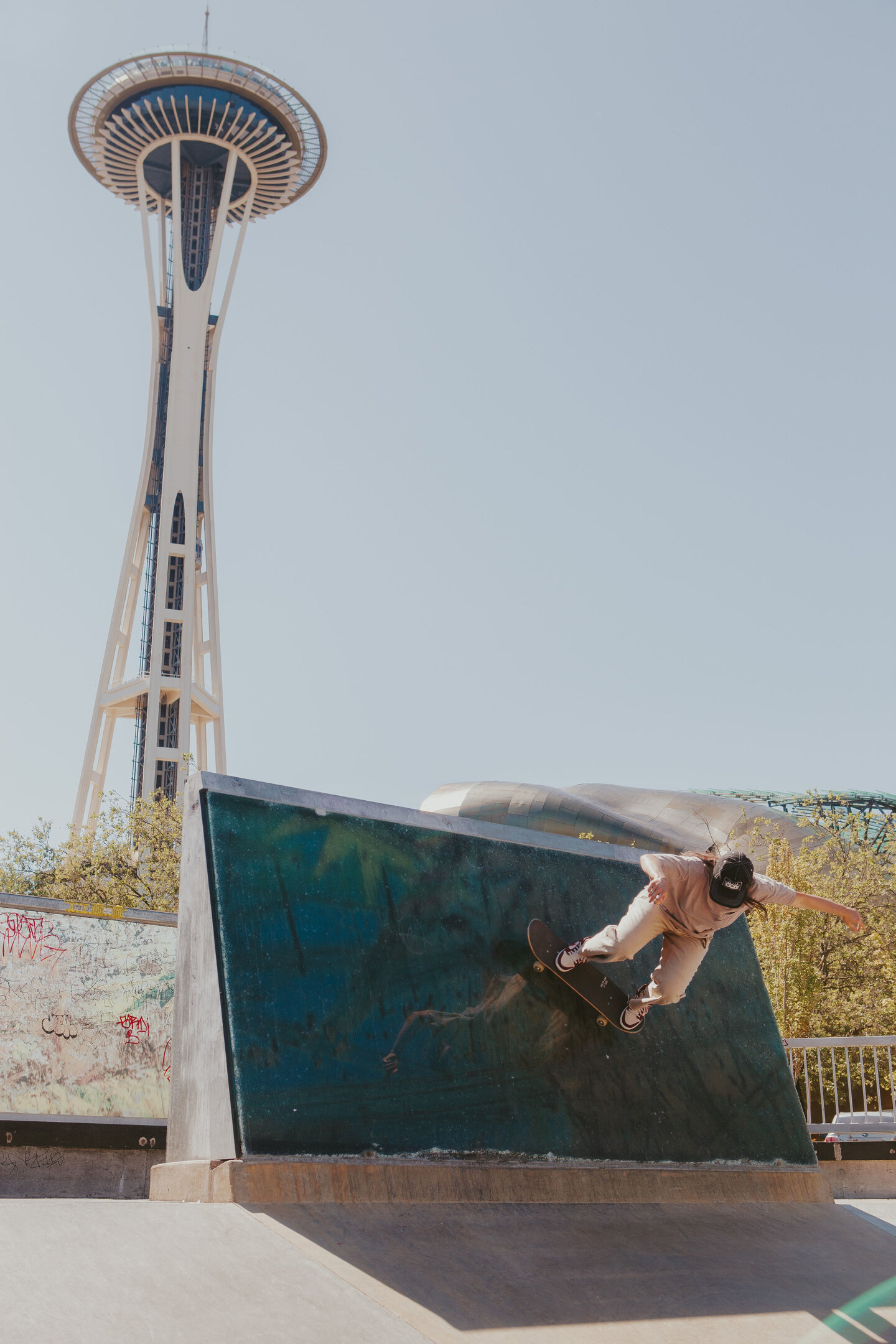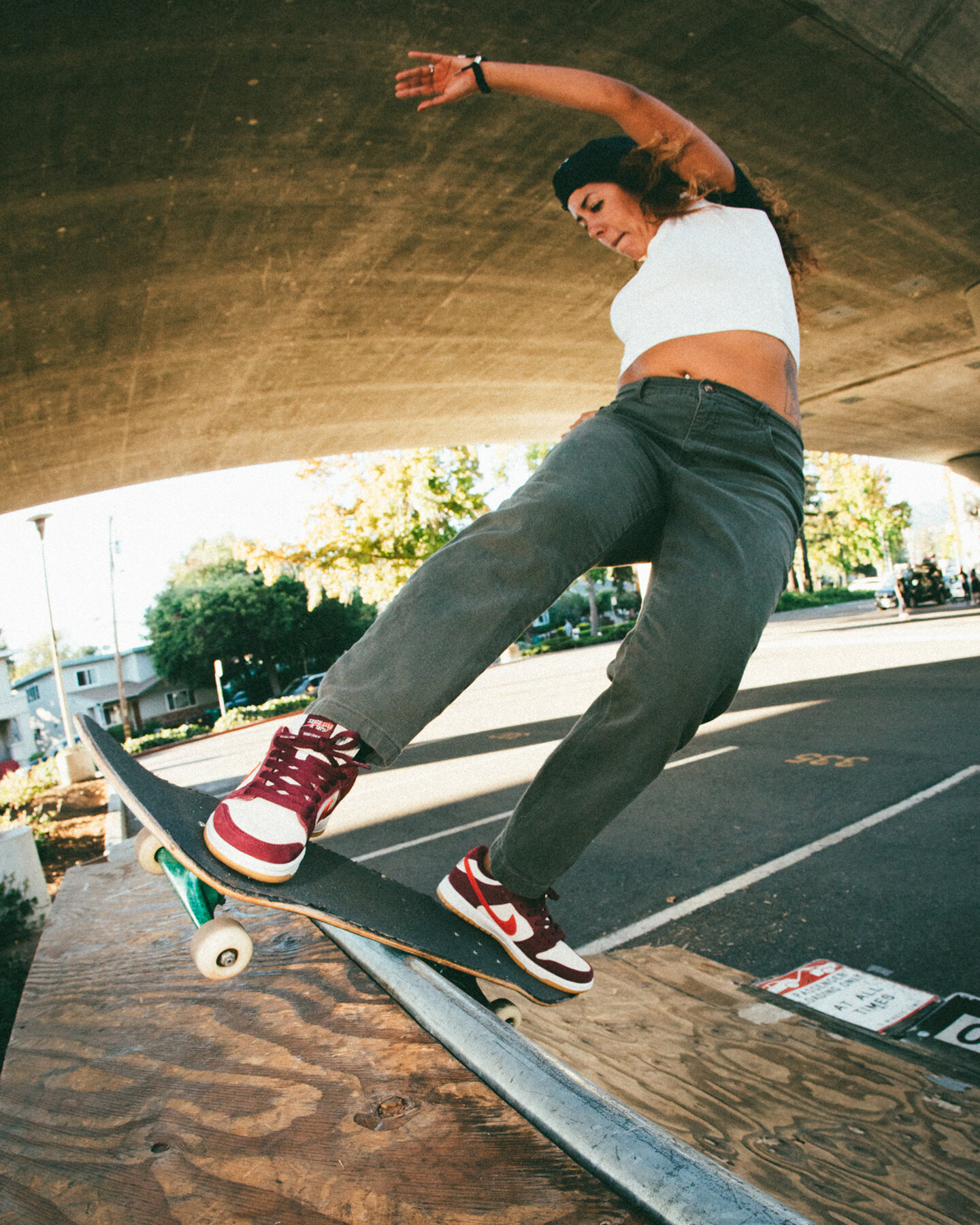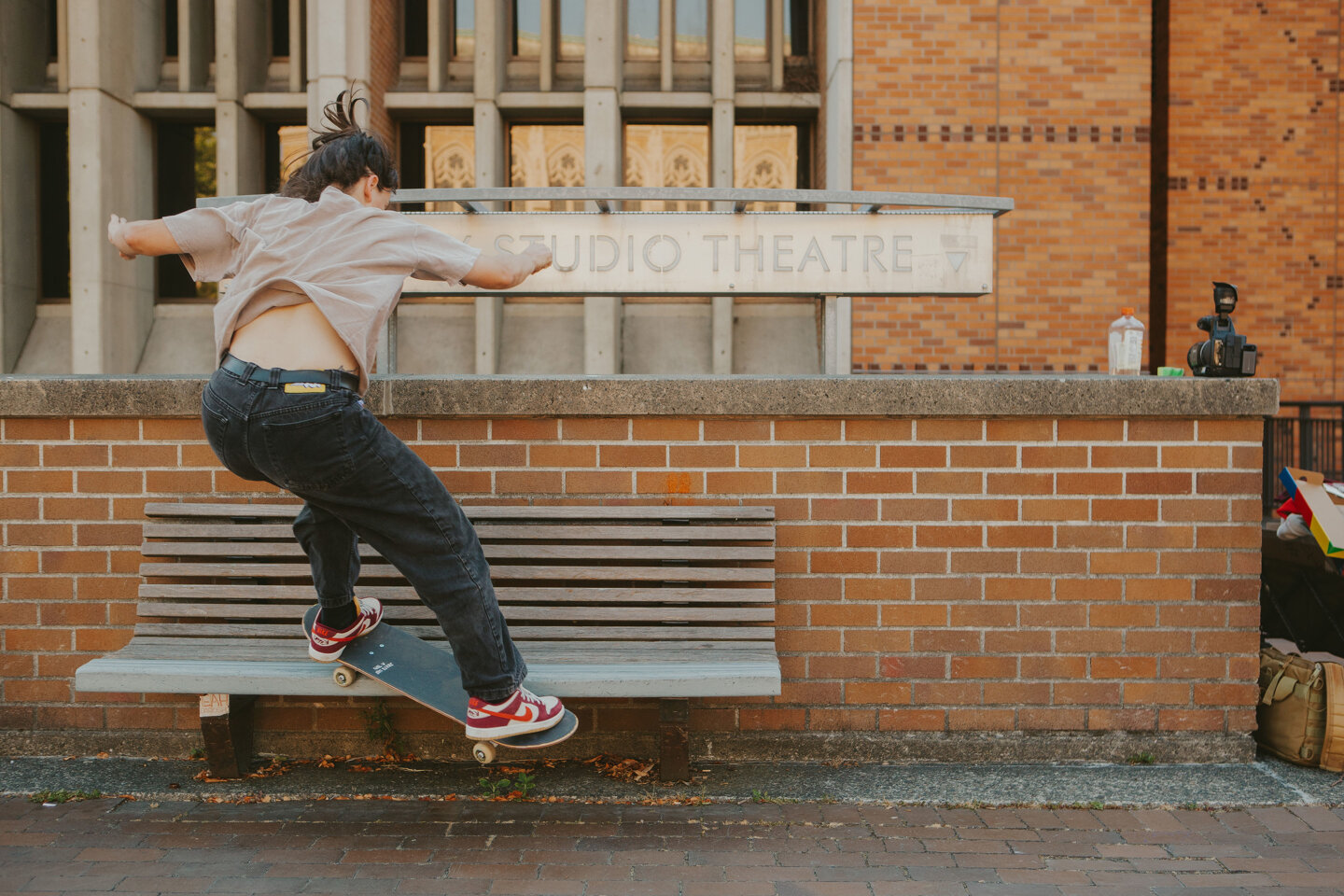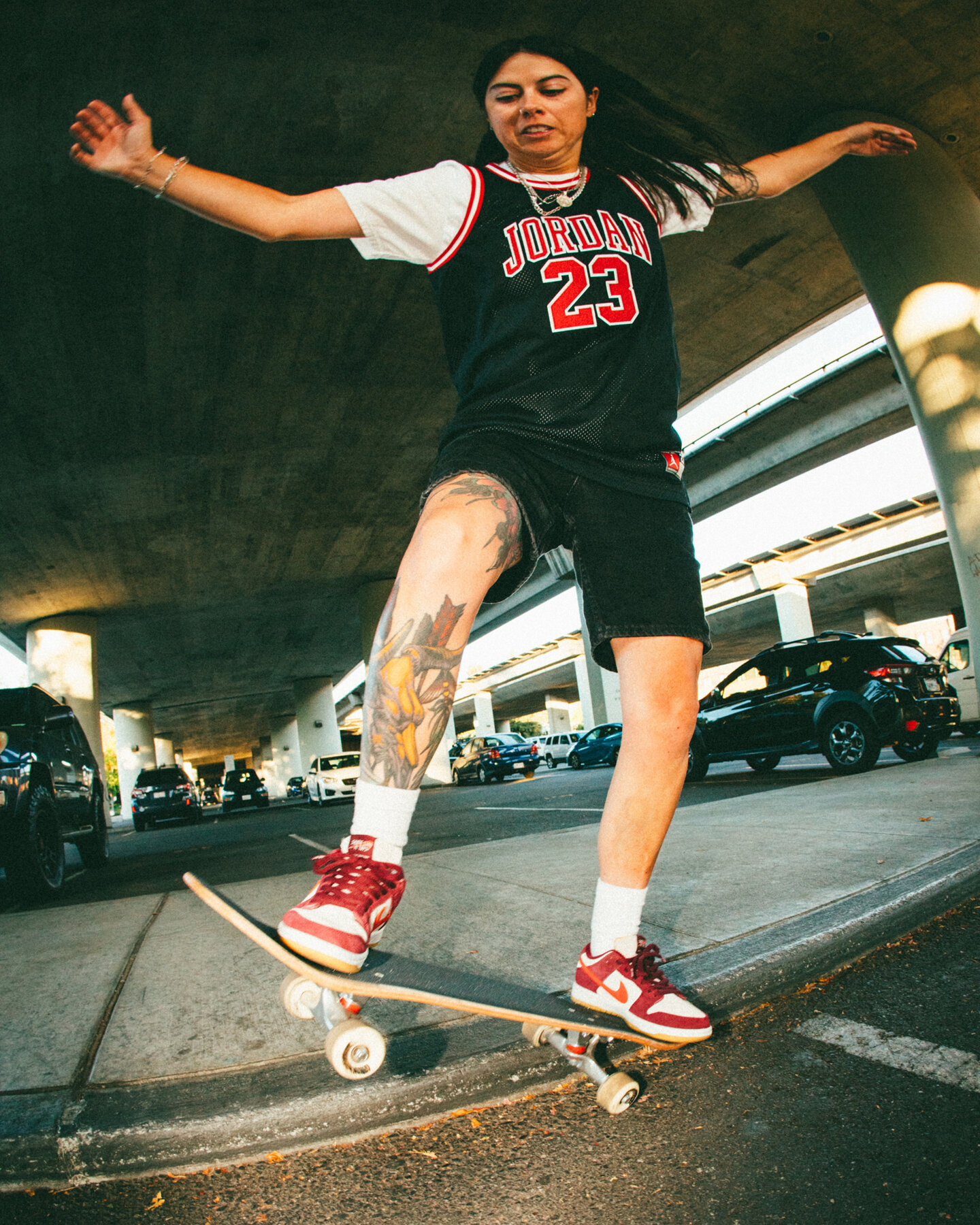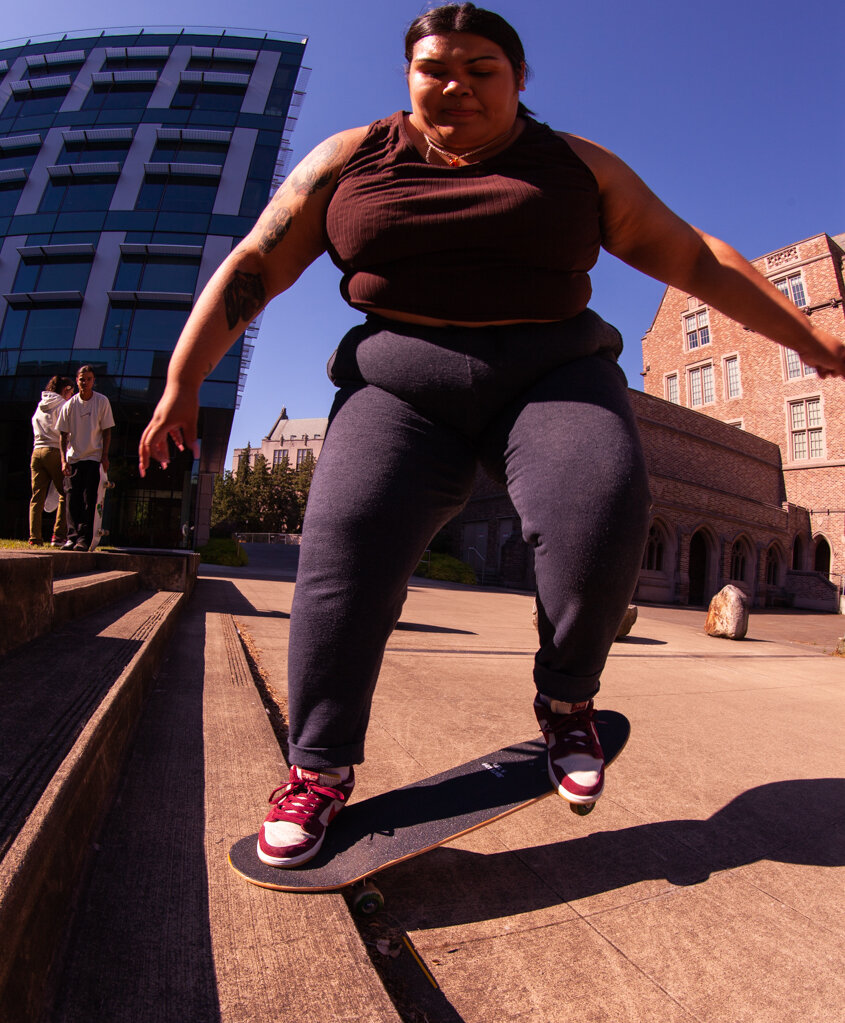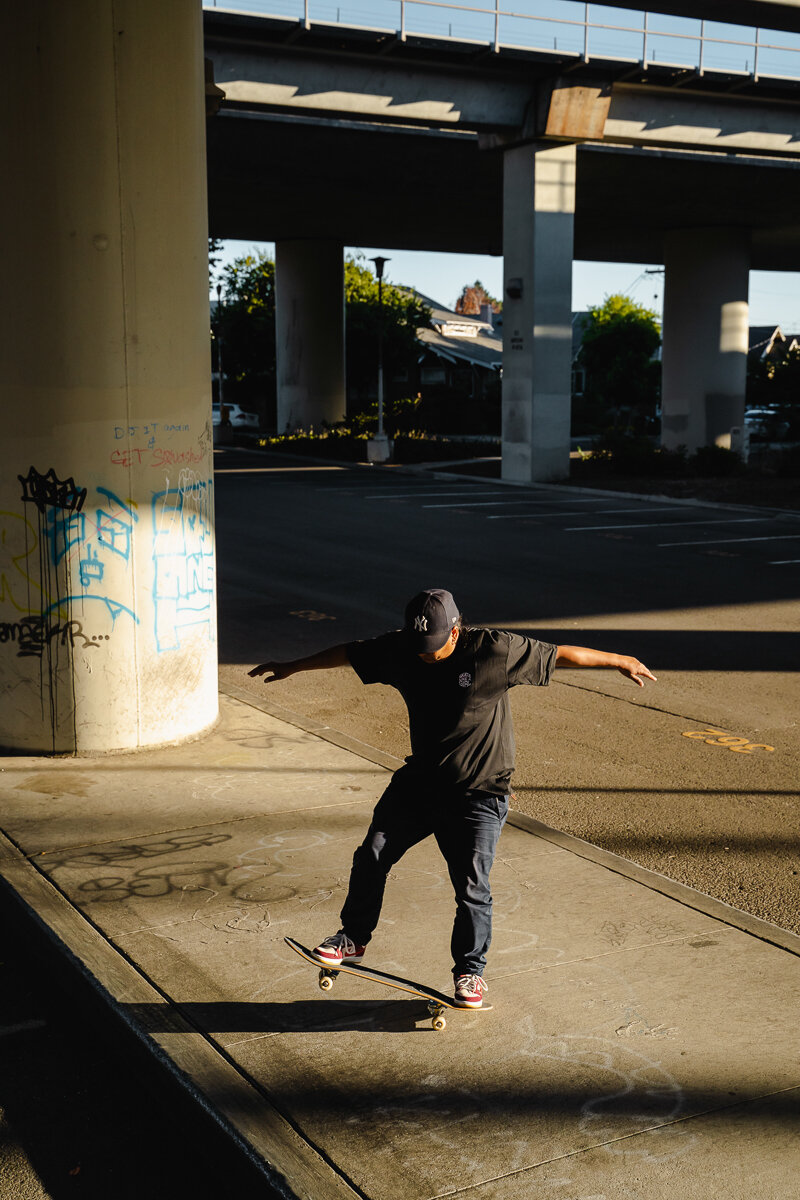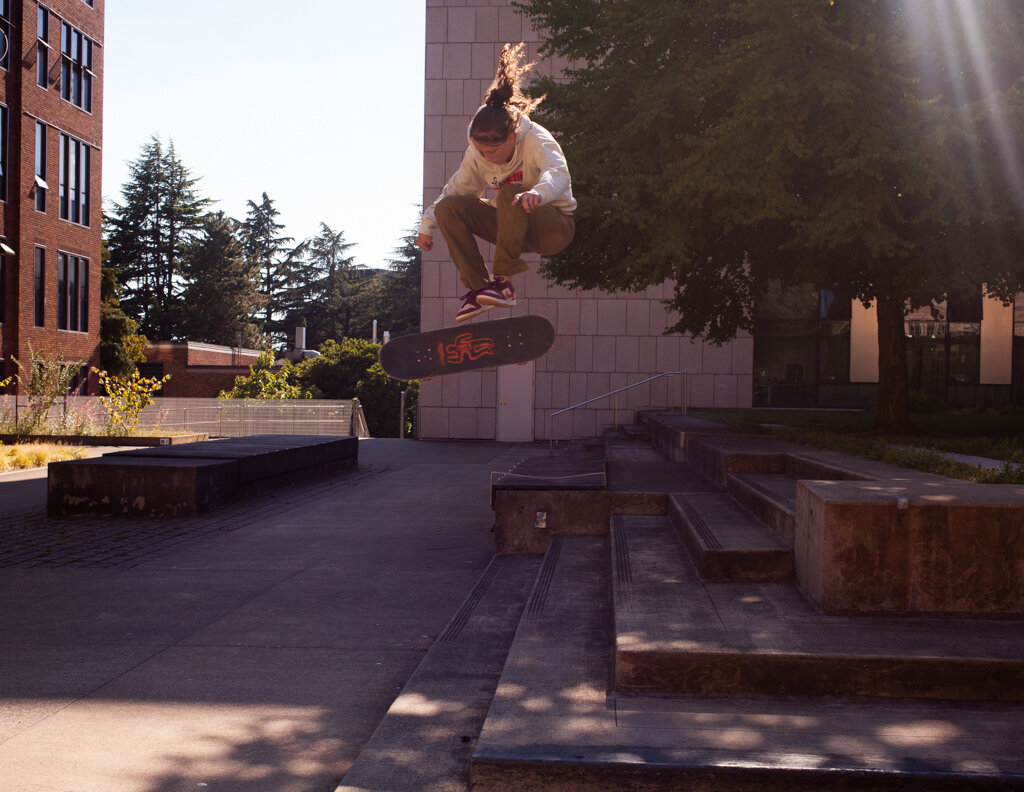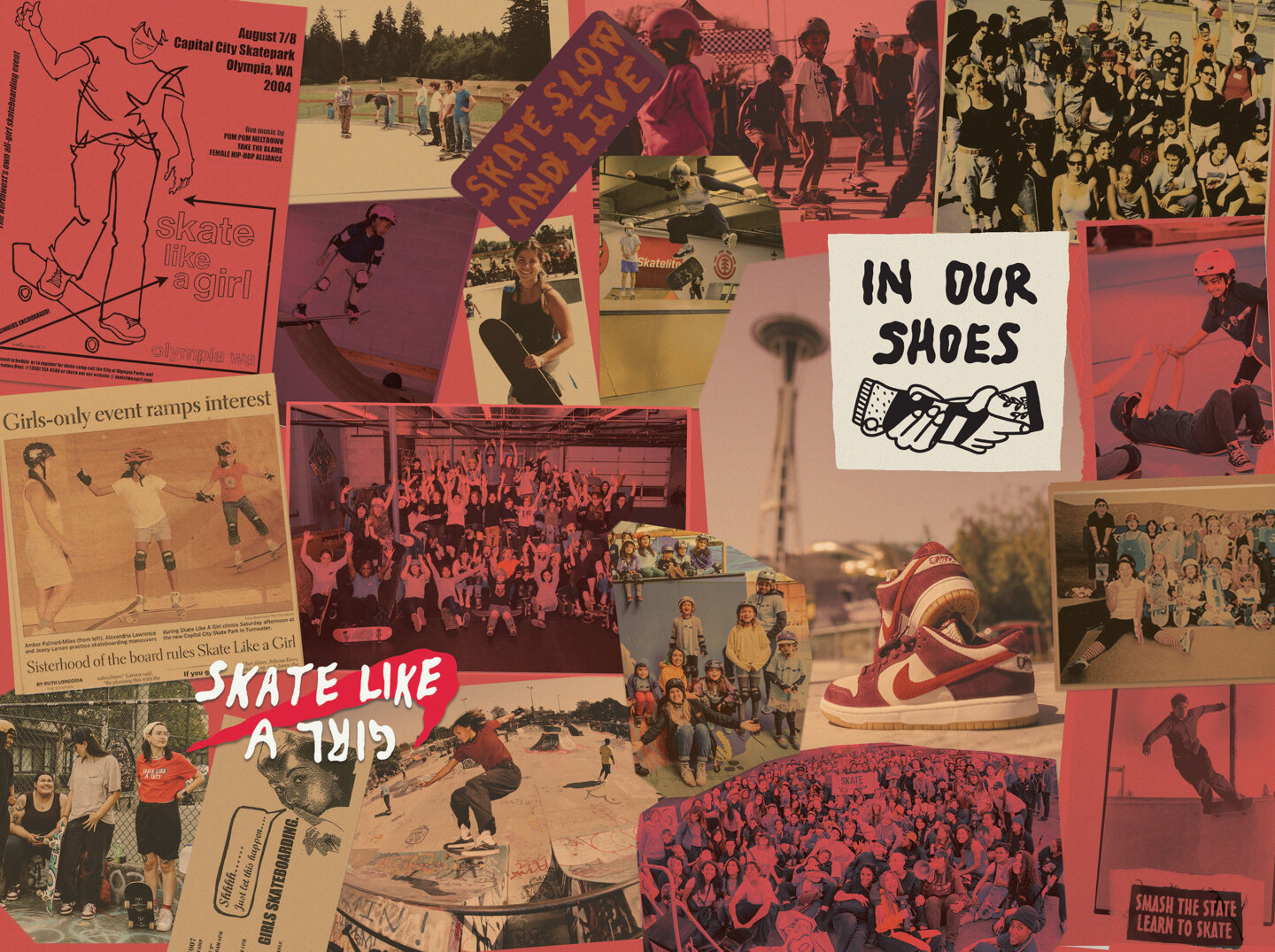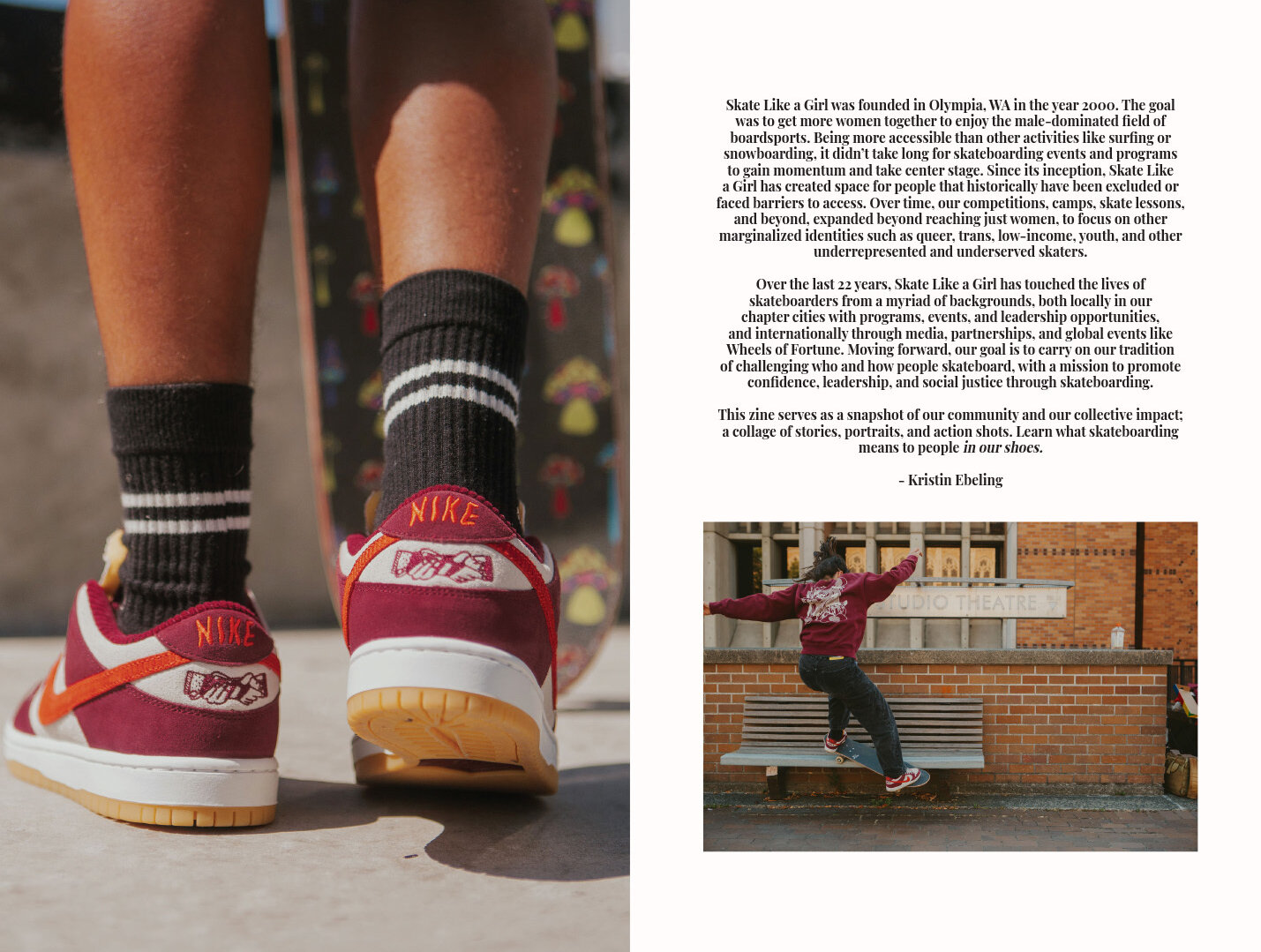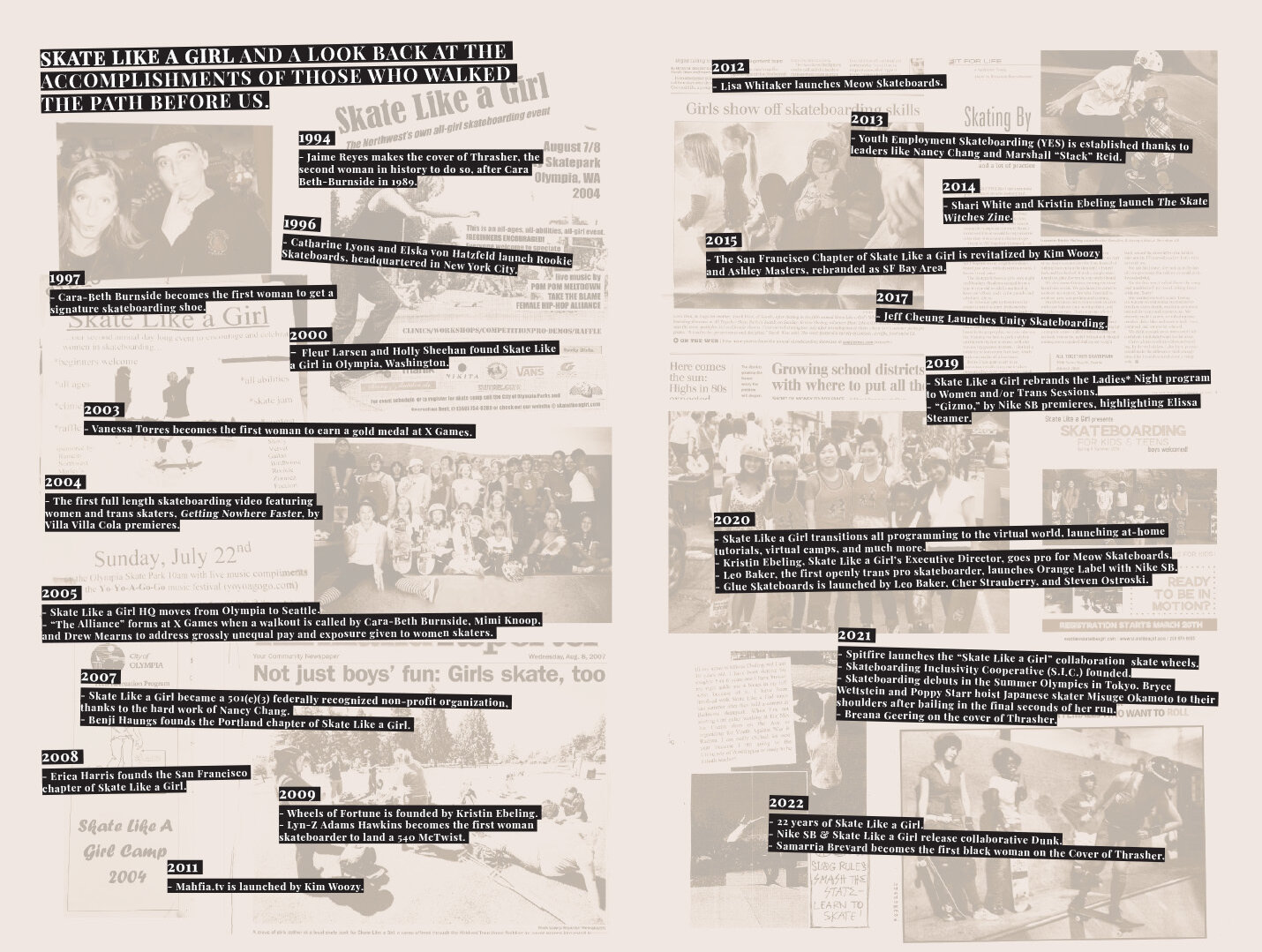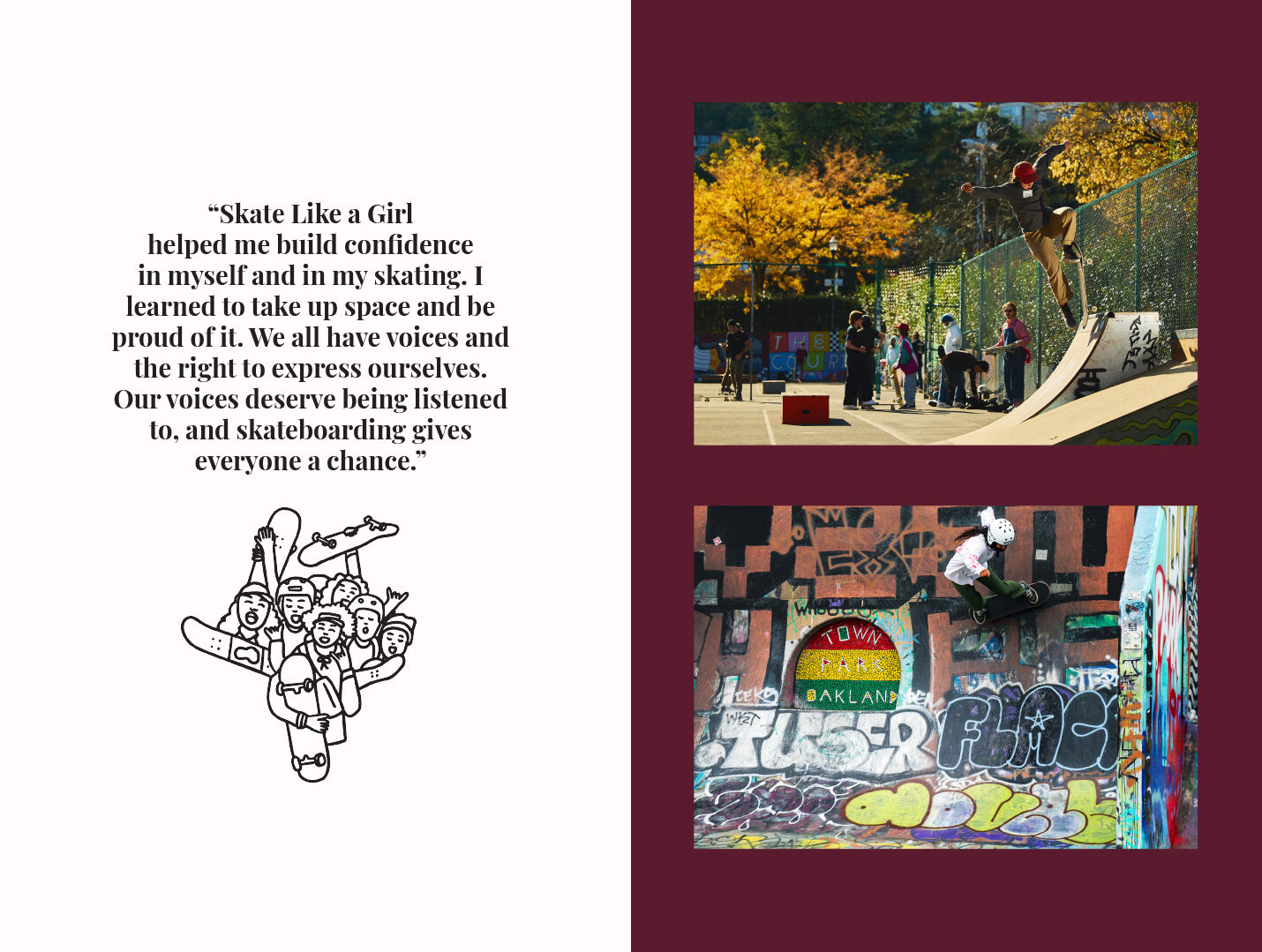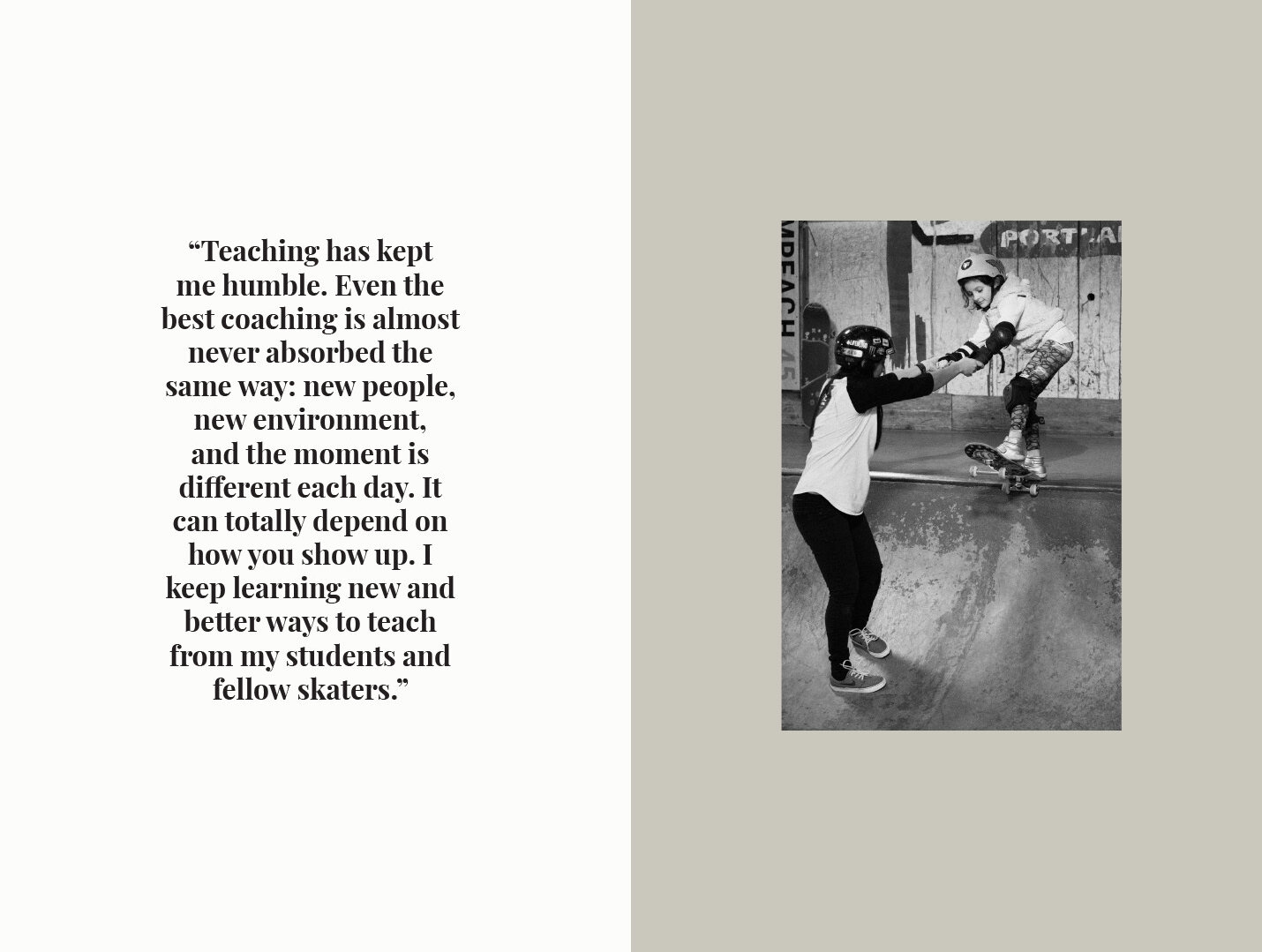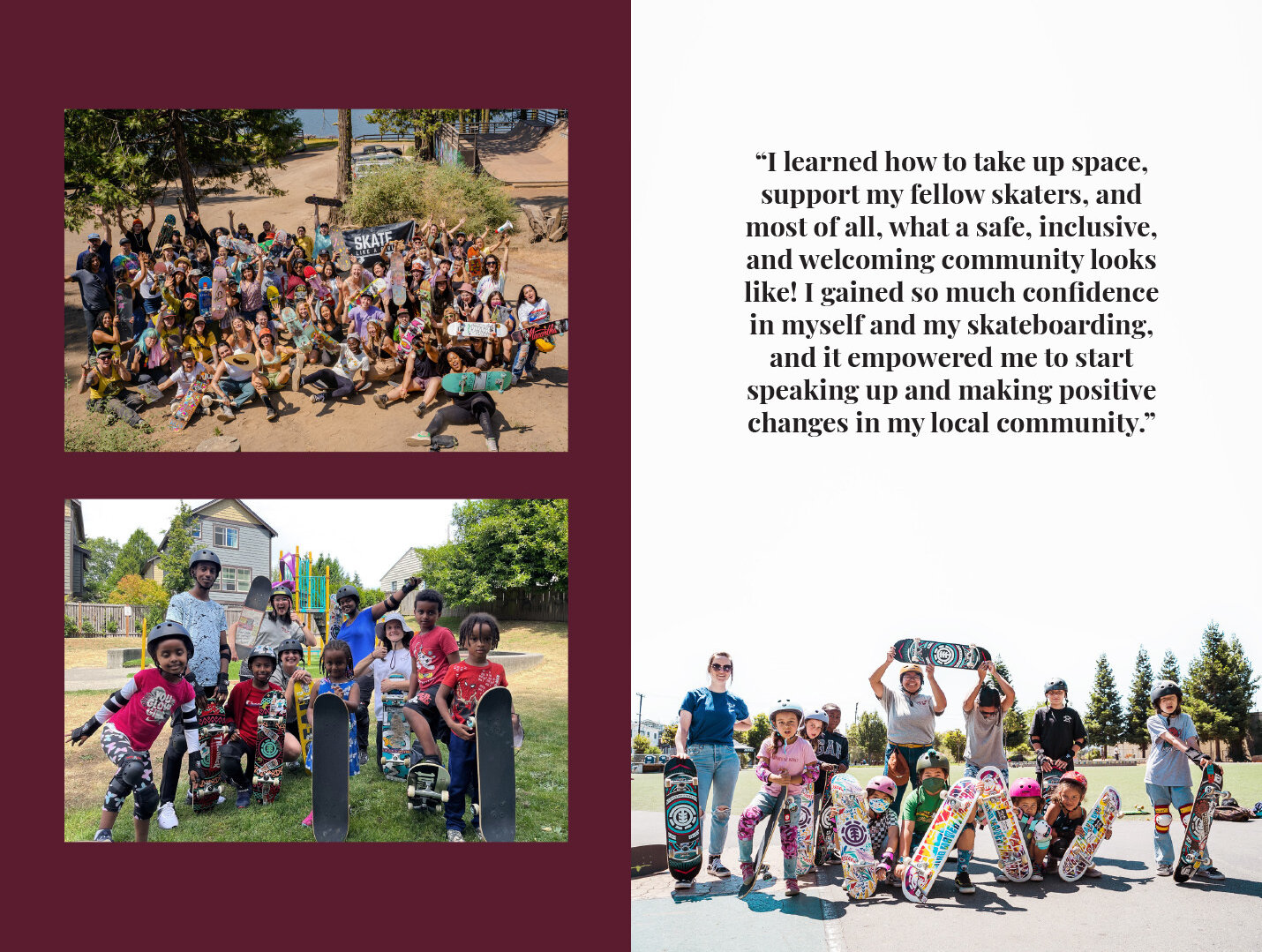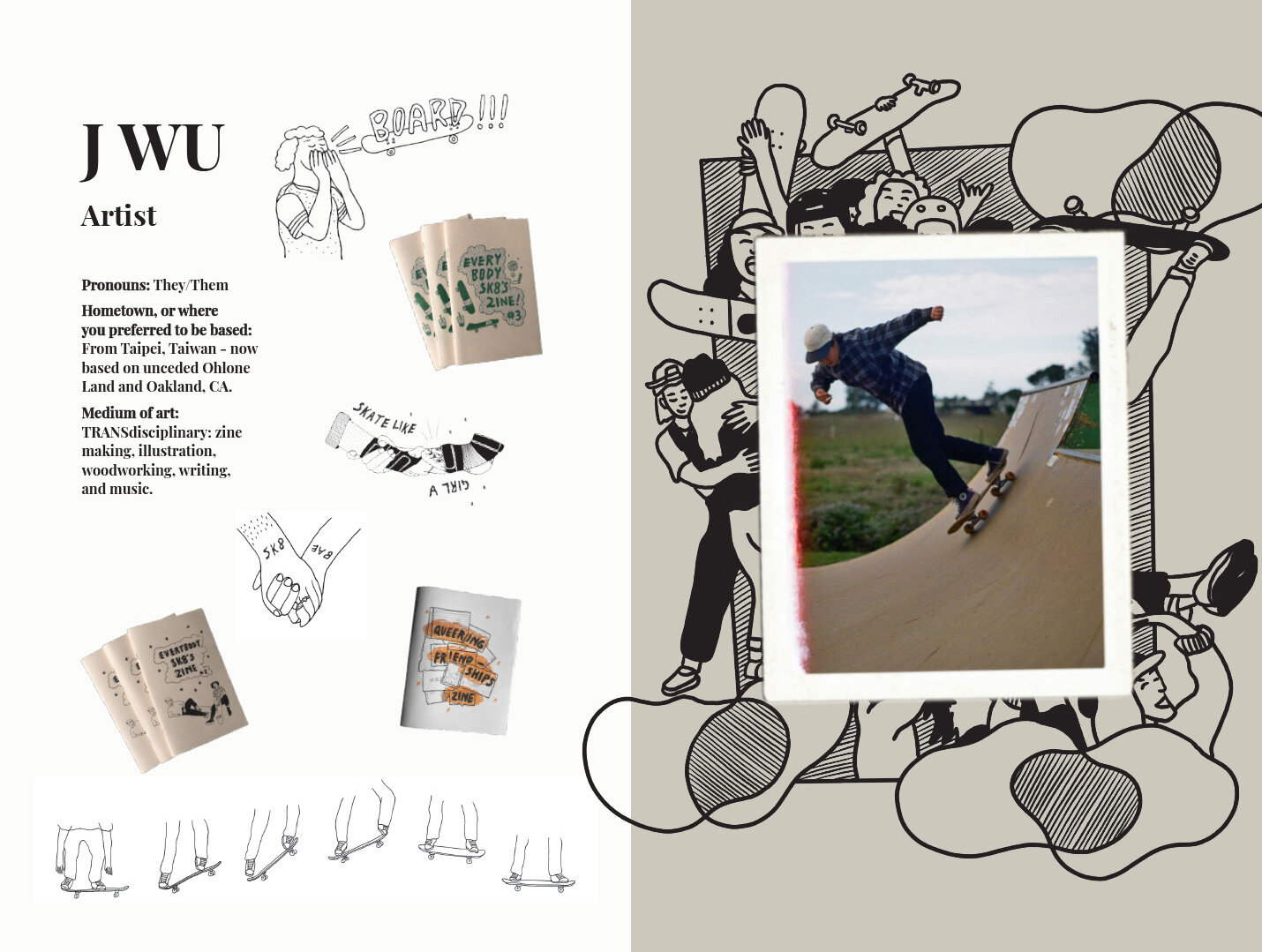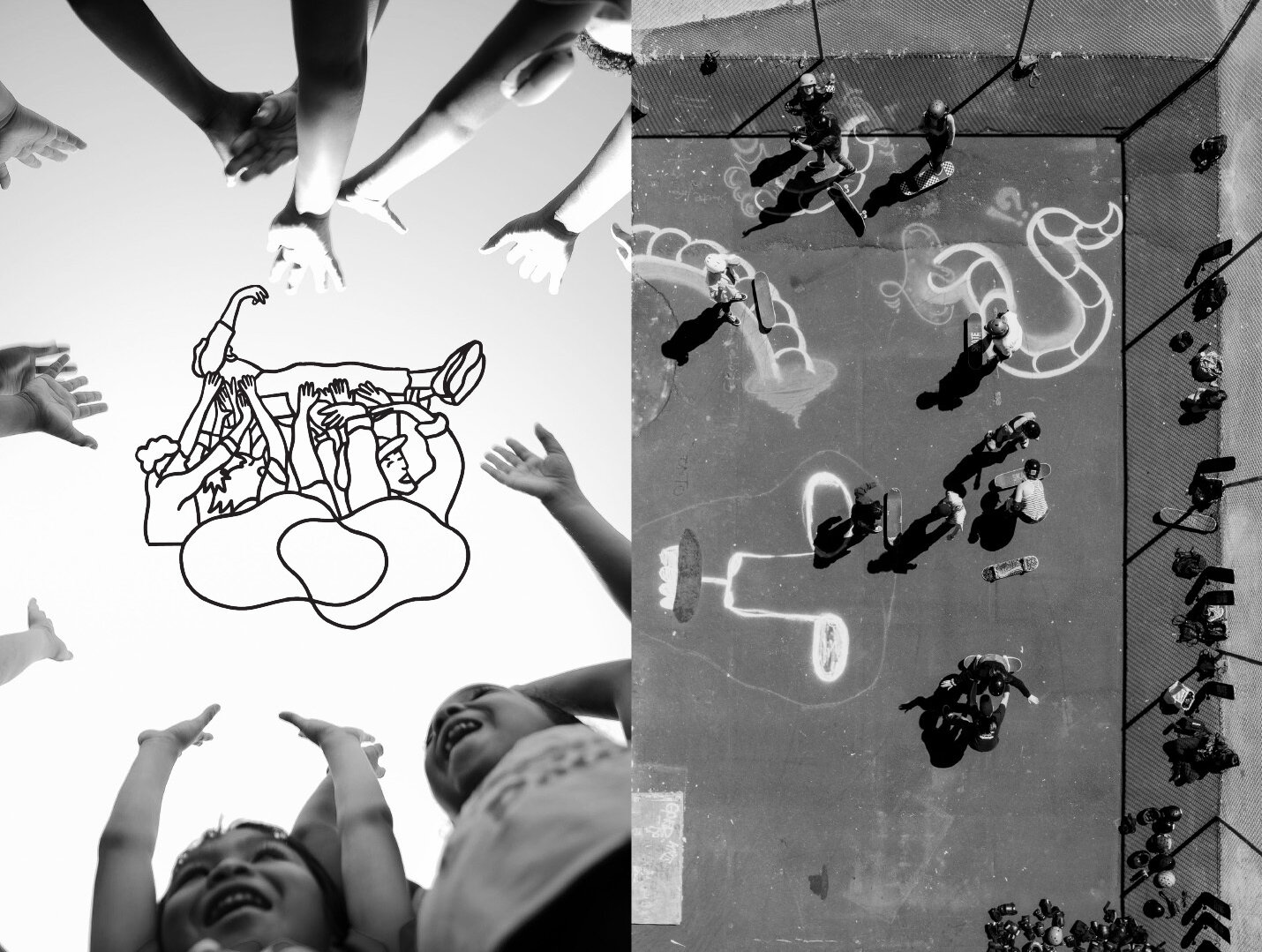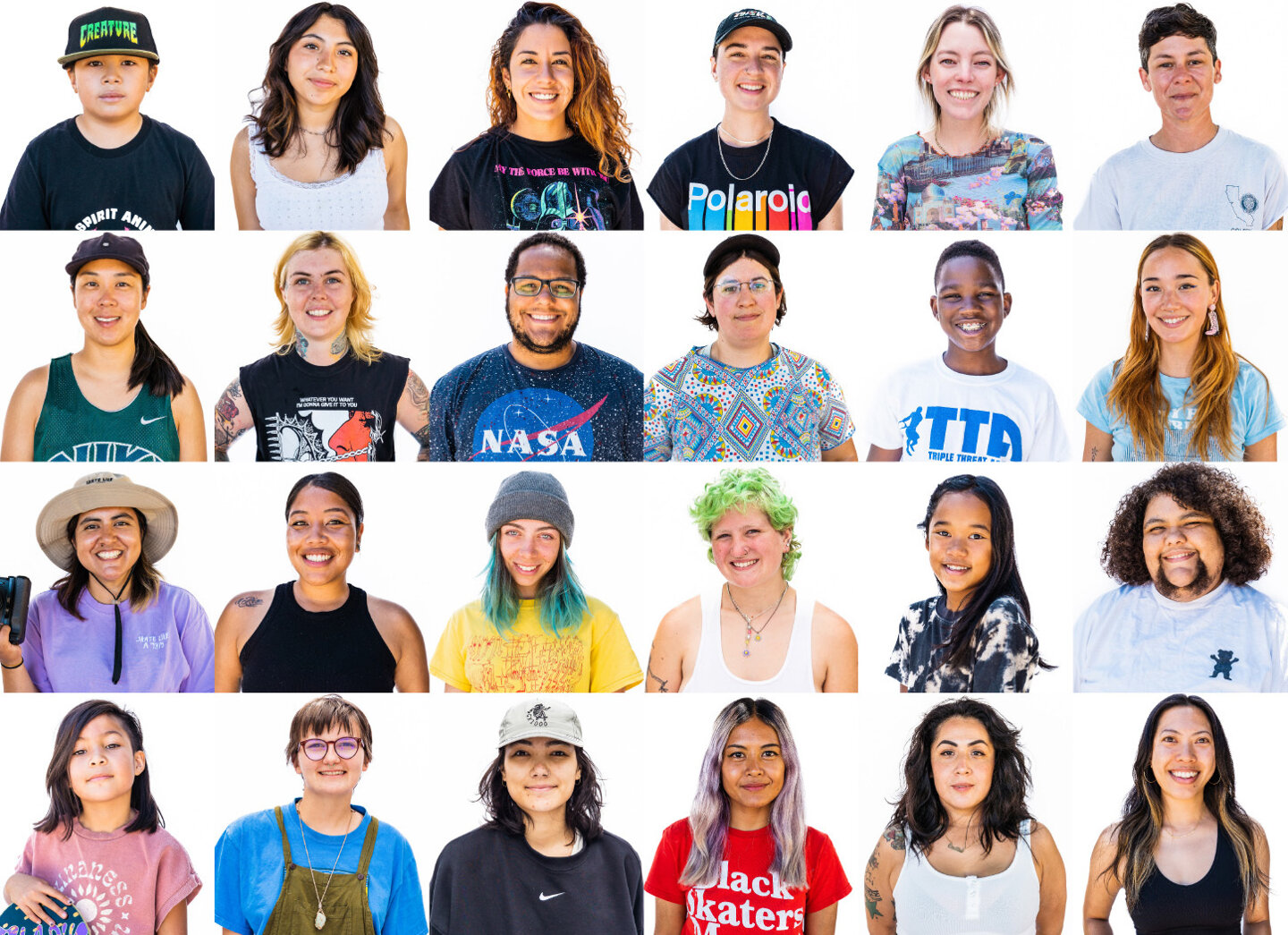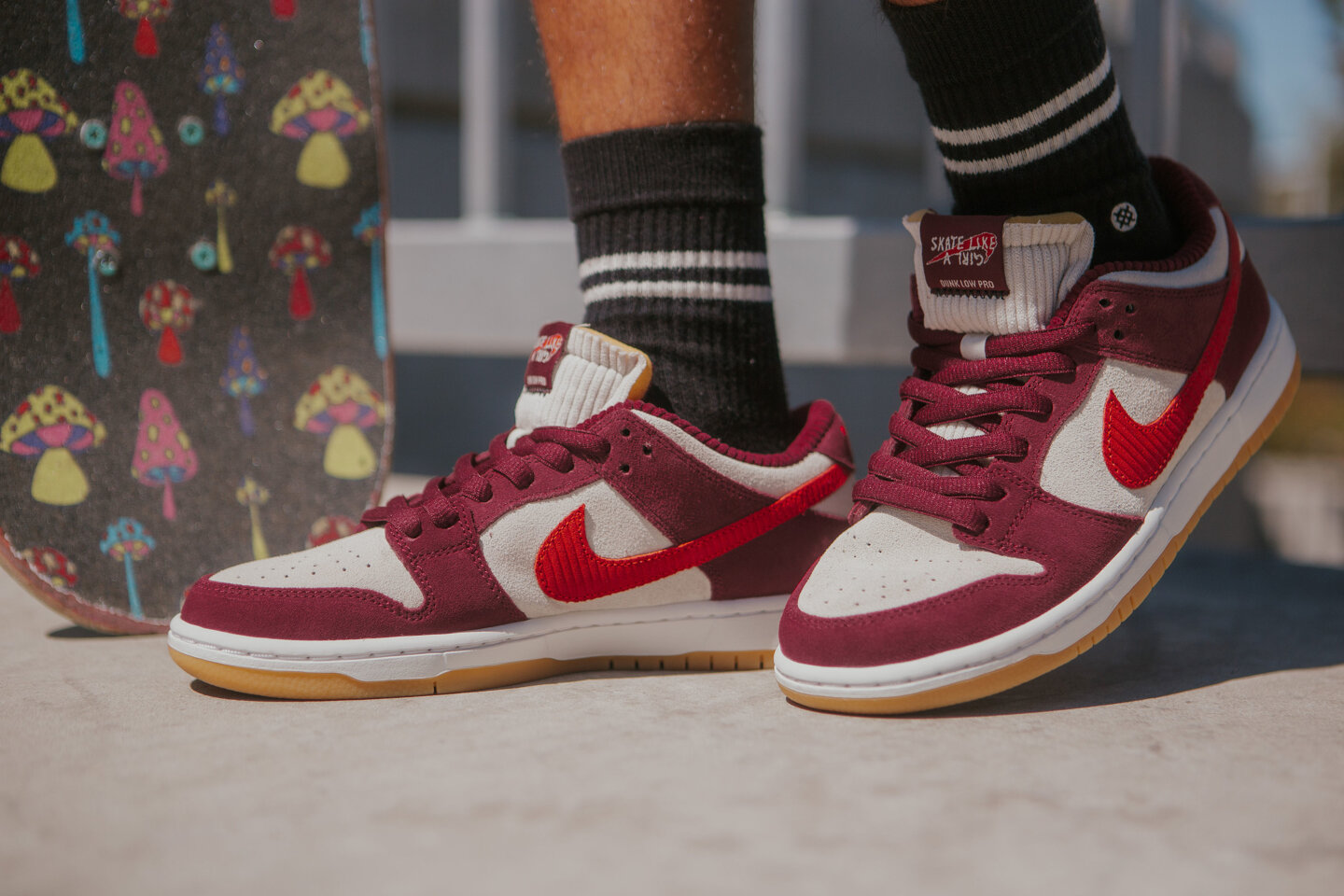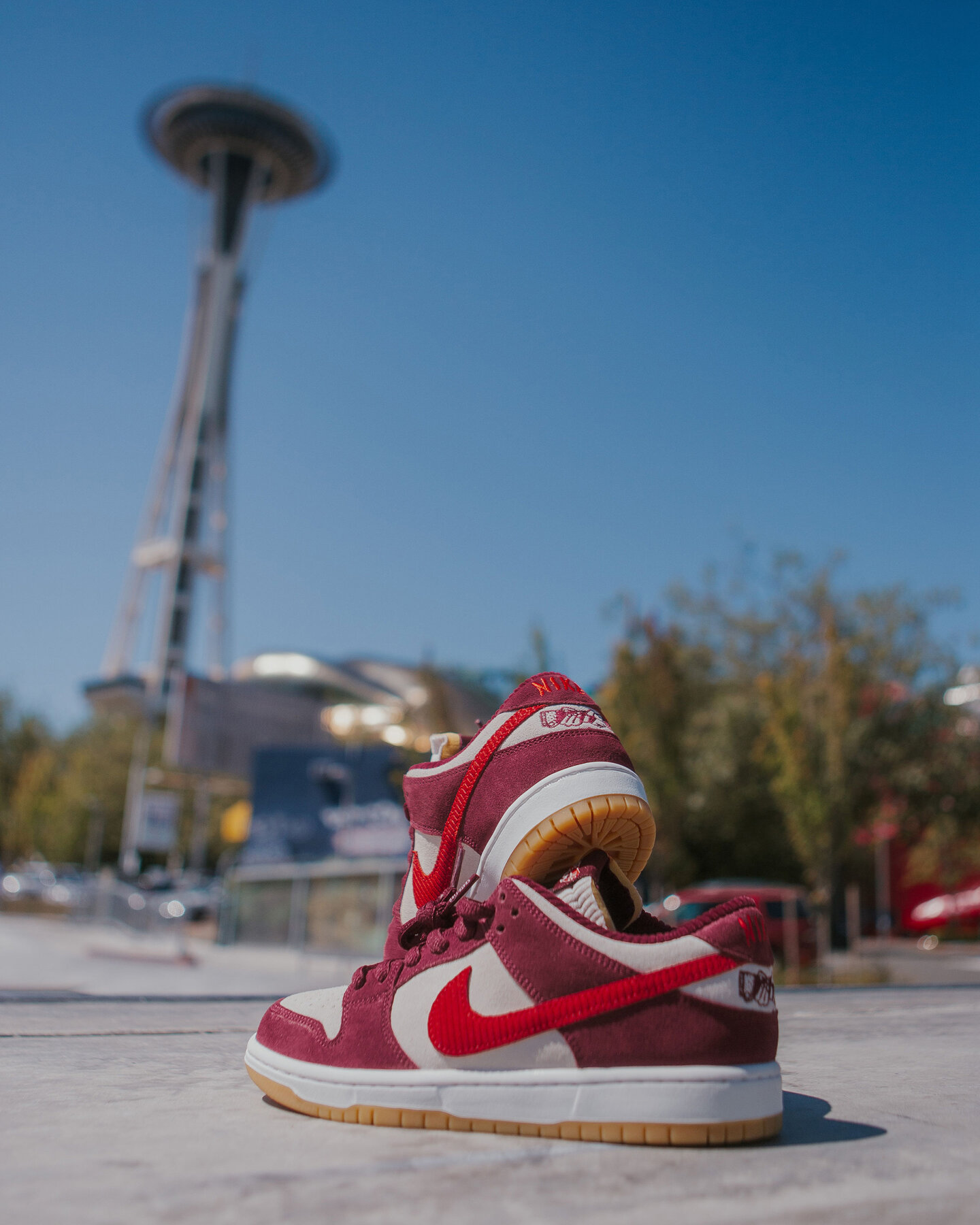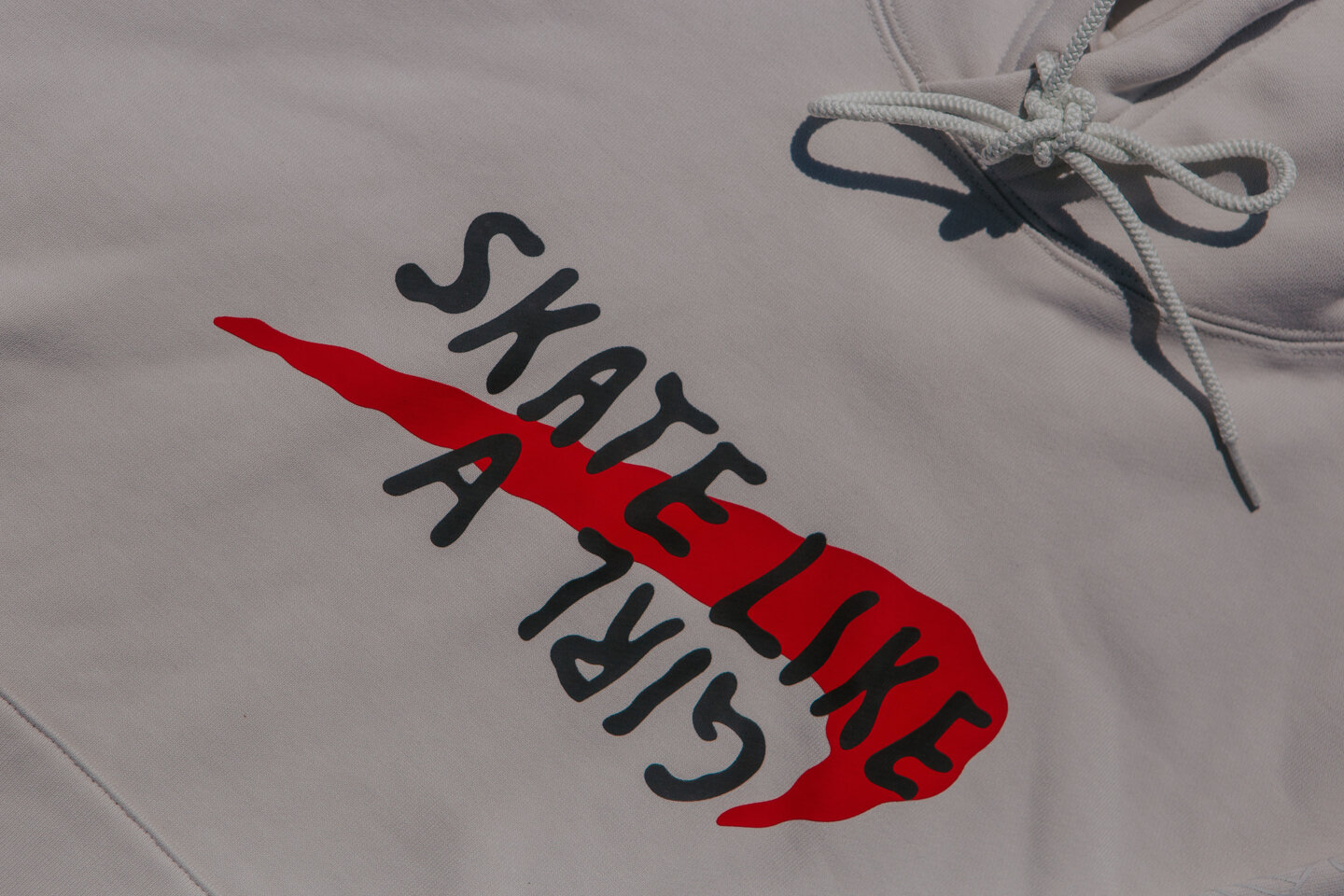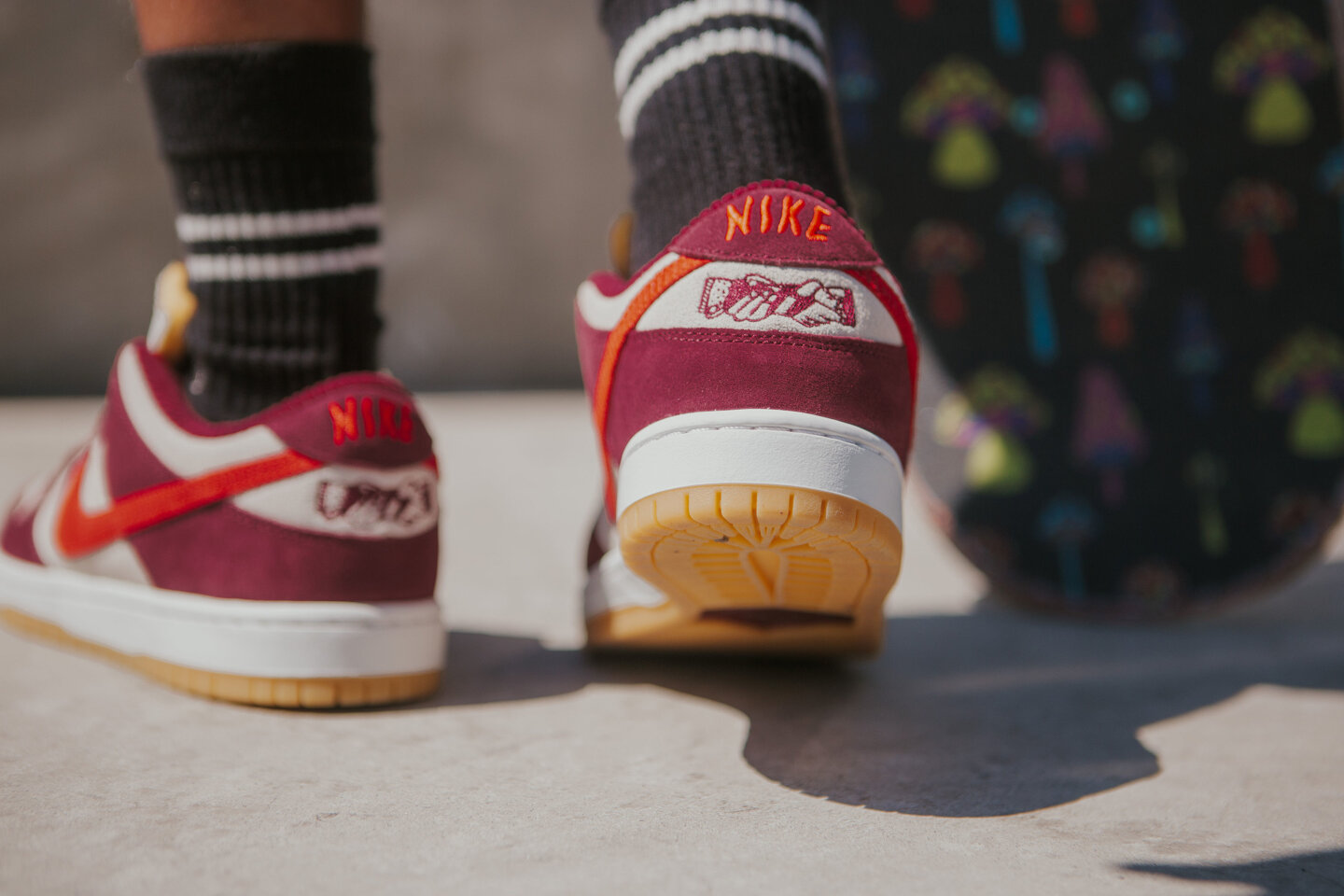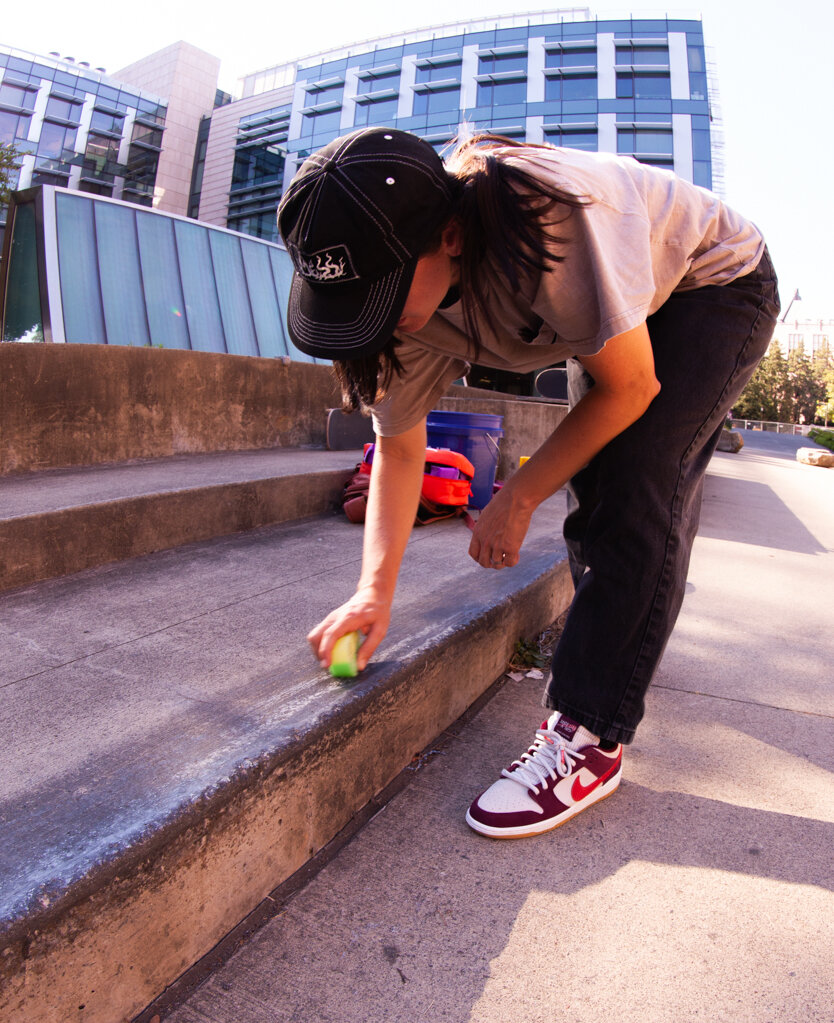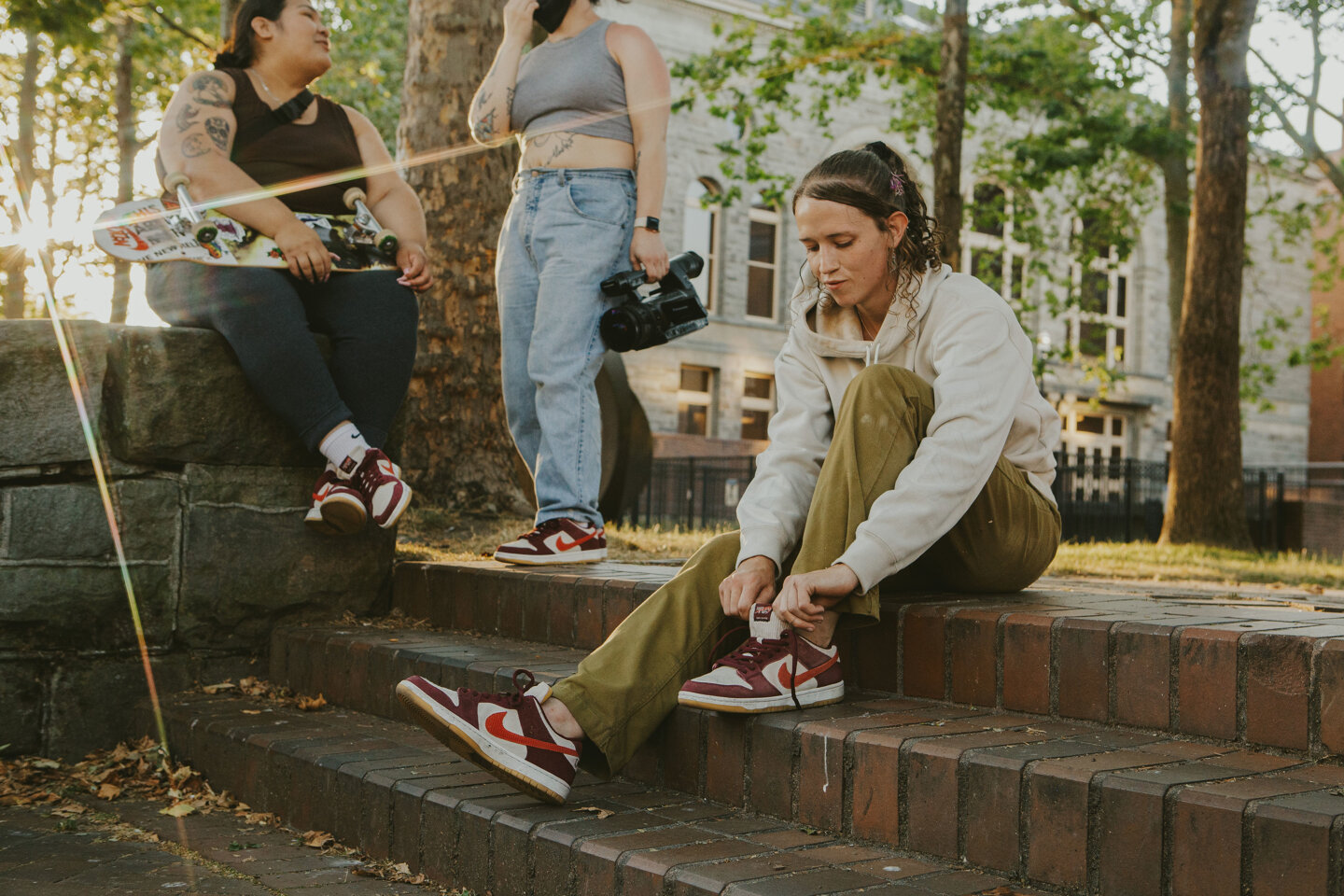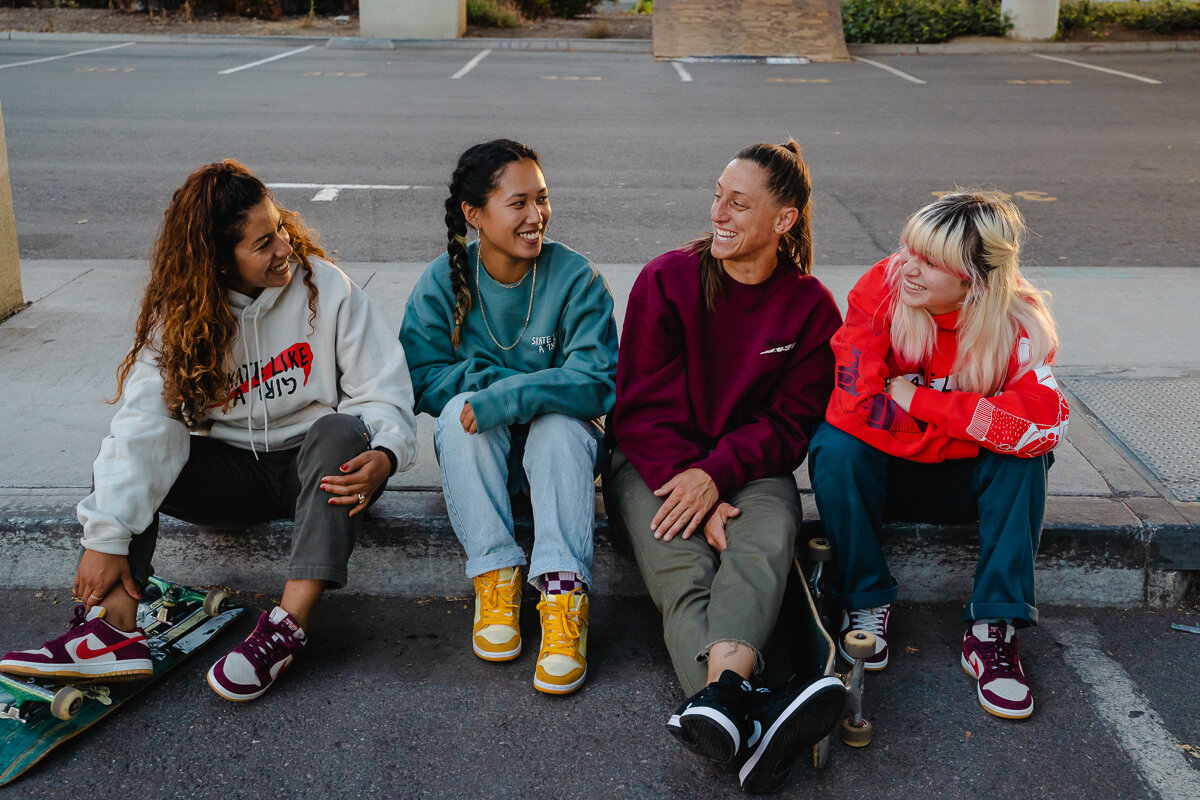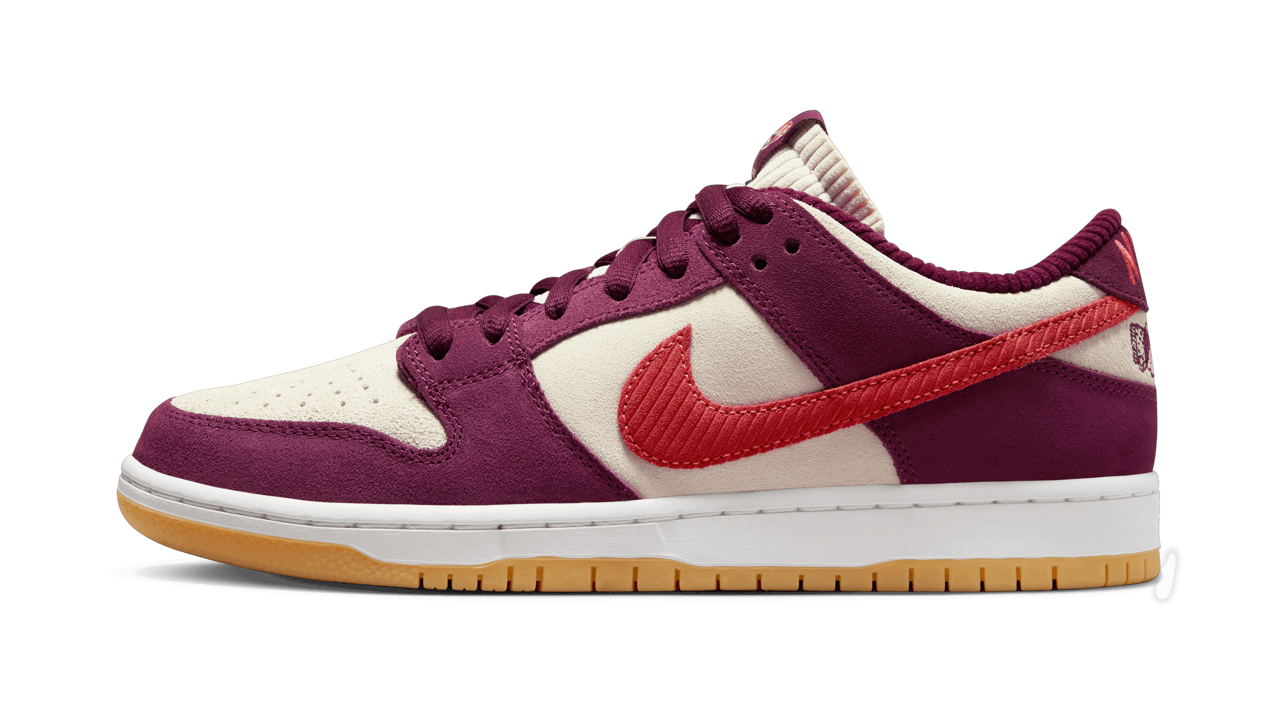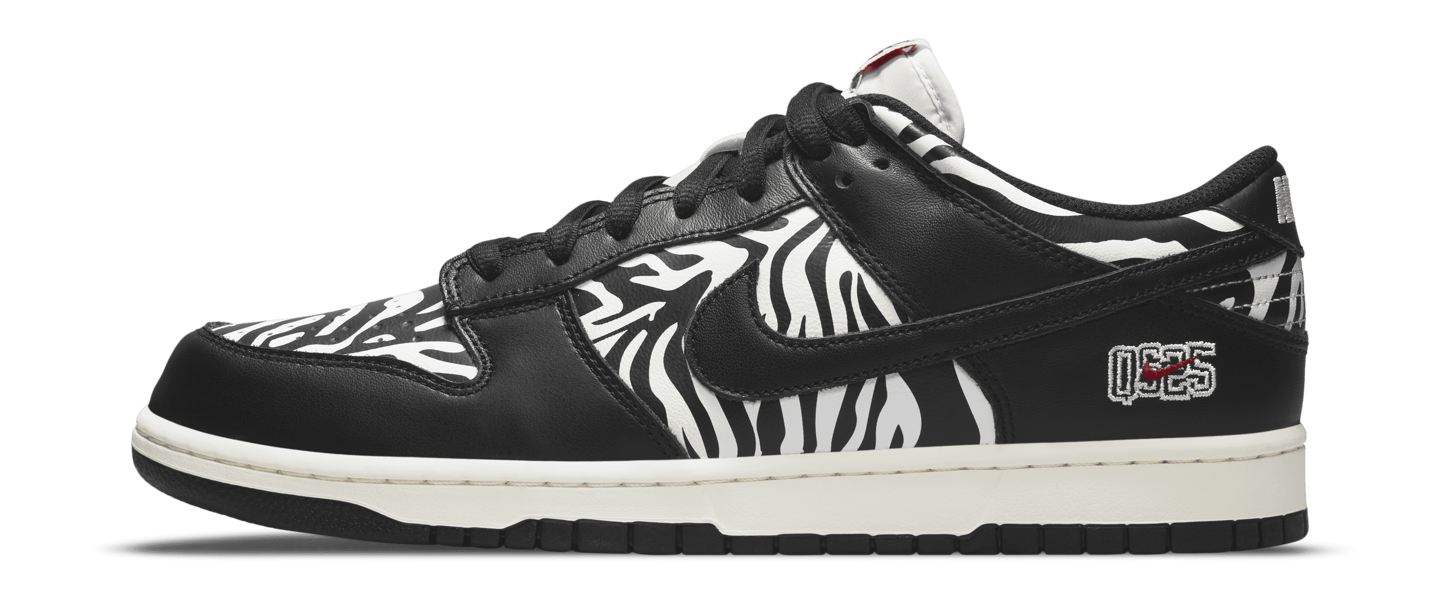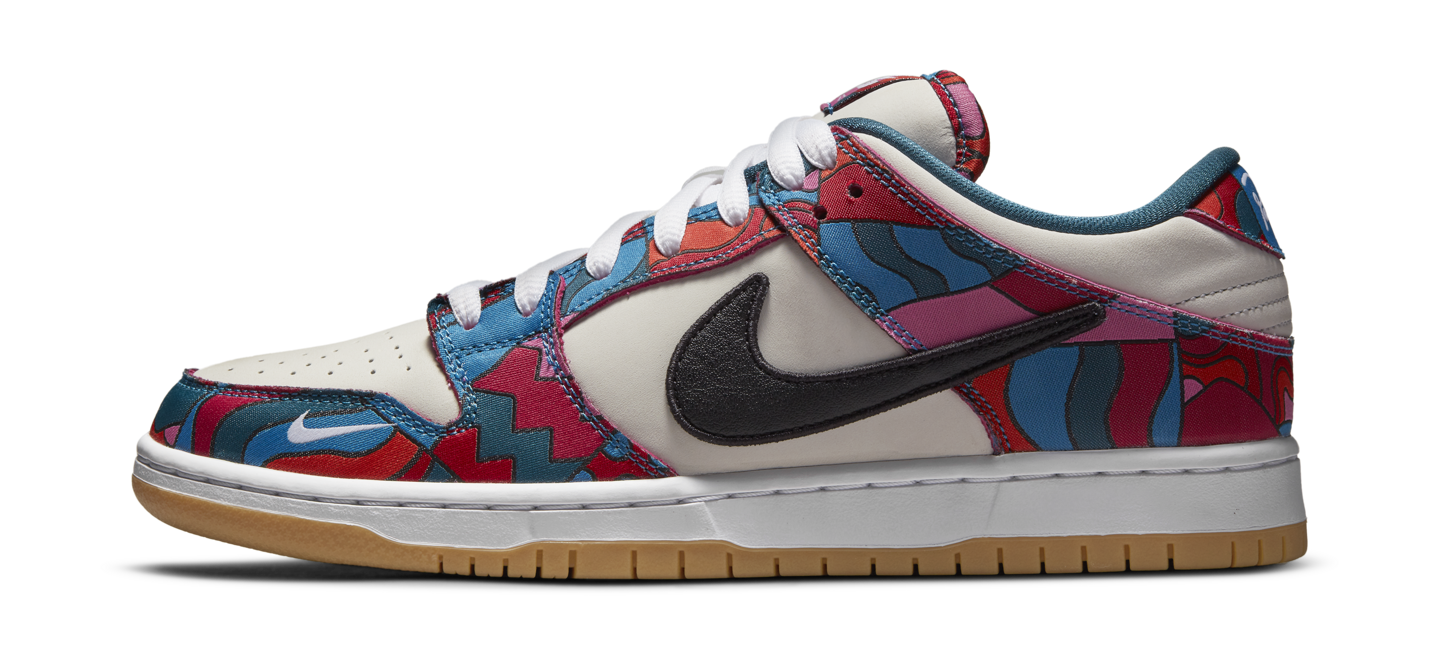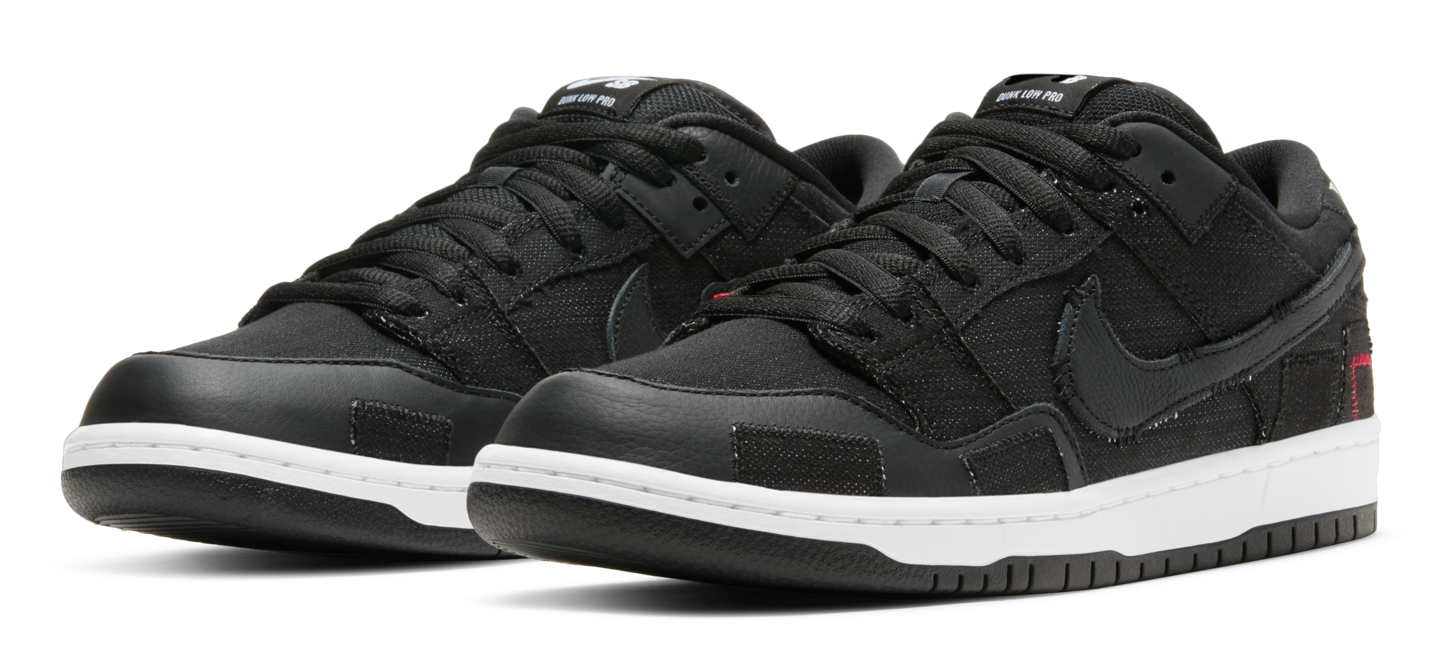Skate Like A Girl
For twenty years, Skate Like a Girl has promoted inclusive community in skateboarding. Over two decades of positivity and action, Skate Like a Girl has grown its chapters and mission to include and foster women and/or trans people by connecting with skateboarders and supporting social causes larger than skating itself.
With a new Nike Dunk SB Low colorway and documentary on deck, we spoke with Kristin Ebeling and Kim Woozy about their involvement with Skate Like a Girl, the collaboration, and the future of the program.
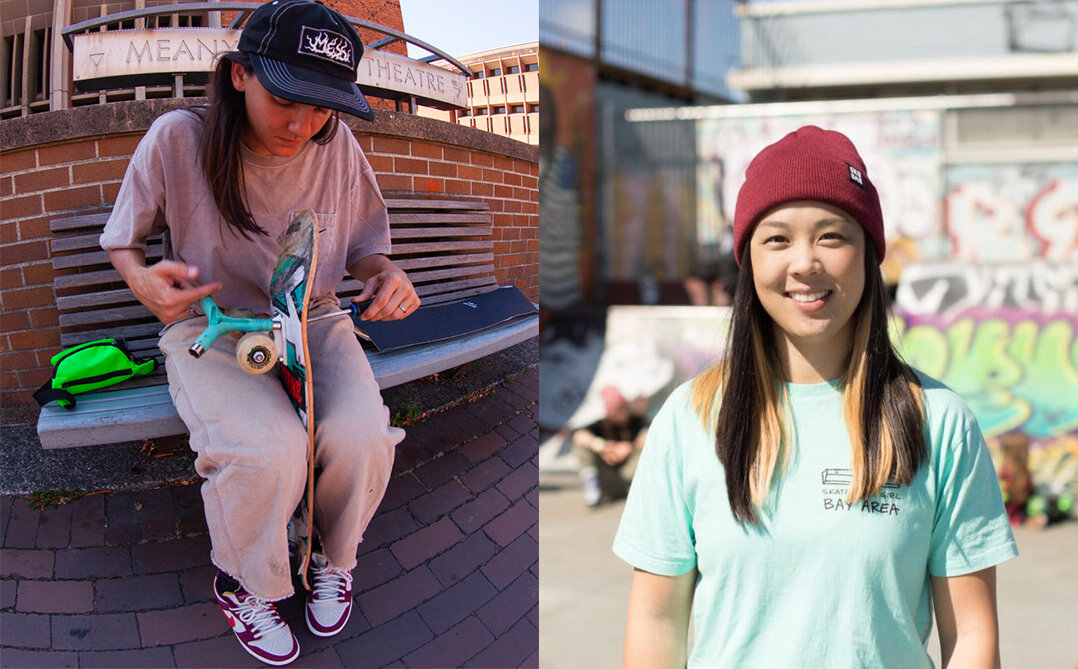
How’d you get involved with Skate Like a Girl?
Kristin Ebeling
I had originally heard about Skate Like a Girl when I was skating in an indoor skate park when I was about 14. I had heard about it but for the first four or five years of skating, I thought I was the only girl ever to do it. A few girlfriends of mine, like started skating with me but they definitely quit within like six months or a year or whatever, right? So I'm kinda lone wolfing it and then I see on MySpace one day that there was an event happening run by Skate Like a Girl and it was at the skate park that I went to. I was like, ‘What? Who is running an event at my local skate park? I'm for sure the only girl that goes there—what the hell is this? I remember thinking, ‘Skate Like a Girl? That’s the dumbest thing I’ve ever heard,’ and I probably used worse language than that, to be honest. I was a 17-year-old with a lot of internalized sexism going on being the only girl in a male-dominated space for many years. So anyways, I rocked up to the skate park there were girls ollieing the 8-stair—keep in mind I’ve still never ollied that 8-stair in my life—there was a girl doing a nollie flip, girls ripping the bowl, there was a woman on the microphone… there were all different folks. It looked like they had invaded my skatepark. I was like, ‘What the hell is this?’ My jaw was on the floor. I always tell people that's the day that I sold my soul to Skate Like a Girl—sign my name in blood, whatever you need. I felt like I had just walked into a dream and it was a dream— a dream I didn't even know was what I needed to be my reality. Basically, from there, I signed up for everything. I was like, You need help running a skate clinic? I'm there. You want a new sticker design? I'm down. I made flyers. I did everything. The cool thing is that the leaders of the organization were rad. There's a 17-year-old kid that rips on a board and like desperately needs our community. Let's mentor her and basically tell her the world's her oyster, whatever you want to create is cool. So they were so supportive. They helped me start Wheels of Fortune, which is crazy. I met Skate Like a Girl when I was about 17 and I started Wheels of Fortune when I was 19 when I was in college. They helped me plan skate trips, they helped me make merchandise. I wanted to make videos—every single thing I wanted, they were like, ‘Go for it’ That was my introduction to Skate Like a Girl. Slowly, over time, I was like, ‘I want to make this my job,’ and I figured out how to do that about eight years ago.
Kim Woozy
Well, my story is not going to be as heartwarming. [laughs] I had already been in the skateboarding industry. Lisa Whitaker (Meow Skateboards founder) had told me about Skate Like a Girl and told me to check it out. My first introduction was I believe Wheels of Fortune Six. It's when I was running Mahfia TV. I showed up and thought, ‘This is crazy. This is amazing.’ Also, I didn’t see many people taking photos, so I wanted to do that. At the time, Mahfia TV had channels for different partners, brands, and crews. So I met Kristin and Nancy (Chang) who was one of the board members at the time, so we created a channel for Skate Like a Girl for any content or anything related to it and stayed in touch that way. After being in Southern California for about ten years I moved back to the Bay Area and Kristin and the crew came down. The Bay Skate Like a Girl chapter was pretty loose and informal at the time. I had gone to a few events but Kristin and her crew had come up to give a training—to give the chapter a boost and say, ‘Let’s get our shit together.’ I attended that and thought it was awesome. All the pieces—the way it was run—I had never experienced anything like that before. That really gave the chapter a boost but I was still really focused on Mahfia.
The chapter eventually got shelved due to people being busy and no one being able to step up to lead it. Eventually, Skate Like a Girl decided it was a liability, there was no insurance policy, so it was shelved for a year and I wasn’t skating with anyone at the time, then I met Ashley Masters who is now the Bay chapter director at a “work in skateboarding” panel and we got to talking and thought we could take it on and run the chapter. I spoke to Kristin and she said that she could mentor us and help make it happen. Ashley and I got on calls with her once a week for a few months and then we were able to get it to a point where we had volunteers, then part-time, and now full-time employees. For me, the biggest difference between Skate Like a Girl and working in the skate industry was being invited to skate, which is the craziest part. I always wanted to be a part of this culture but generally, people working in the industry and the pros would stick together and everyone else was outside the bubble. The most I ever skated was when I met the Bay crew and went to their sessions. Ashley and I realized that if we didn’t put our energy into the chapter, no one was going to make it happen. All I ever wanted as a 15-year-old living in Fremont, California was to have people to skate with. Now I move back to the Bay, there’s the sick park, and still, no one skate with me. So it was like, ‘Well, selfishly, we’re doing this ourselves.’
Can you tell us a bit more about Wheels of Fortune? This past year it really seemed to have a moment and be a really defining event for skateboarding.
Kristin: Wheels of Fortune is something where a pro can come and have a good time, someone from the industry can have a good time, and I want people that are beginner skaters to have fun. There’s a little something for everyone. My whole thing is that in order to move forward sustainably, the world can't be one person hosting dinner for everybody. It's got to feel like a potluck. Everybody's bringing something and so that's really like the vibe of the weekend. So like for instance, we saw Unity come in and help host the queer and trans skate jam. We have a house band called Hella Doubt—they came in and performed. So yes, it's hosted by us, but it really does have a potluck type of vibe. Everybody's bringing a little bit of something and I want it to really feel like for us by us. Many hands make light work. I think that's why it feels special is because it's not just a skate contest, it’s not just a party. It’s four days with a little bit of everything. We have panels, we have workshops, so it’s educational but also, we have a band and karaoke… we have a scavenger hunt, which is just fucking around with your friends, but then we also have a competitive skateboarding contest. If you're an upcoming skater, you can come to get noticed, if you're a crew, you can come and like meet other crews. I just want it to be something where people come and didn't think this was possible. I want to recreate the feeling that I had when I walked up to my skate park at 17 years old and my jaw hit the floor. I want to create that for other people. I want to be the mentor that I had when I was younger and I want to create an event that makes people trip.
It might sound simple but we also think it’s powerful that you had so much encouragement that young and it led you to a career. Can you talk about the importance of that mentorship?
Kristin: Juxtaposing that experience—meeting these cool adults that were running this organization, they had tattoos, but they had their shit together. They were not the typical skateboarder in that they weren’t very good at skateboarding, but they were doing all this cool stuff. They knew pro skaters in California. They were kind of these cool mentors that just sort of showed up in my life. Prior to meeting them, everything in this world, I felt like was telling me I couldn't (skateboard). My dad was telling me I shouldn't skateboard because I'm a girl and I was going to ruin my pretty face and mess up my shins. My dad literally was like, ‘No one's gonna ever want to marry you if you look like this.’ He was very strict and hard on me because I chose skateboarding. I quit all sports to do this, right?
So my dad was telling me no, I was going to the skate park and I was getting bullied so badly that prior to meeting Skate Like a Girl, I just skated pretty much every day in my own garage. I wouldn't even go down to the skate park because they were so brutally mean to me and exclusive. And then my skateboard was telling me no—fucking gravity, dude! I was eating shit all the time trying to learn how to skate. I felt like everything was telling me I can't, I can't, I can’t and finally, I met these people who said, “You can do whatever the hell you want,” and I was like, ‘What? Let's go!’ Suddenly I had this blank canvas to just create. I really thank an honor like the founders of Skate Like a Girl for saving my life. I have friends who have died, who are in jail, who got mixed up in doing hard drugs. That was who I was hanging around with and that could have been my story. Instead, my story is one of continuing to create and dream big.
“In Our Shoes” is a 26-page ’zine available at select skate shops alongside the Skate Like a Girl collection dropping October 15.
Since being involved with Skate Like a Girl, what are the biggest things you feel that you’ve accomplished or what changes has it facilitated in skating?
Kristin: The proudest moments that I have are just casually when I'm out skating in Seattle, and I'm at the skate park looking around, and I see young men that are leaders and they're inclusive, they’re ripping, and they used to do our teen volunteer program. They got their 50 community service hours through volunteering with us when they were younger. Then I see a little girl that did our skate camps and I see a dude that's a donor and maybe someone rocking a Skate Like a Girl shirt. Then I see someone roughly my age skating. Anecdotally, being a part of a skate community where I feel like everyone's all in—not just about creating space for little girls or women, queer, or trans people. To me, the toxicity that exists in skateboarding and in our world doesn't actually benefit anybody. It hurts some people more than others. I don't think it's a net positive for anybody. It's really cool to be a part of a skate community that's bought into the idea of inclusion. We were filming a little piece and had to close the skate park to be able to film it. Kim had to be the person to go over to the people that were skating in the park and say, ‘Hey, guys, sorry, the skate parks closed.’ It was a bunch of dudes and Kim told me she was nervous to kick them out but they immediately were like, “Oh, it’s for Skate Like a Girl? We love Skate Like a Girl!” That to me is the thing that makes me feel the best.
Doing this for almost two decades… it’s doing something and it’s done something. In a broader context, a couple of things I feel like we've really led the charge on is like really being intentionally inclusive of trans people. We’ve been calling our sessions women and/or trans sessions, we've done queer and/or trans skate camps going back to 2018 and earlier. So I feel like we've been ahead of the curve on stuff like that and just seeing the larger skate community use words like “non-traditional skaters,” I feel like we've been thought leaders in some of the framing around that and making sure that like our community isn't just here for girls because, yes, we started just doing skate stuff for girls and women, but then we realized fuck, trans people need space, queer people need space, we need to be partnering with Unity and organizations like FroSkate to join forces to not recreate the same harm that we experienced coming into skateboarding—keeping the door open for the next generation of people who aren’t having space.
Kim: Normalizing beginner status. That’s why I didn’t skate for the longest time. All I saw working in the industry were pro skaters and team managers who had been skating forever and were former sponsored skaters. This was pre-Instagram, so it felt like if you’re not good don’t skate. Whereas, with Skate Like a Girl we've normalized “Skate slow and live”… helmets, wrist guards, pads. With our WT camp helmets are required, because it's YMCA’s policy and we didn't have to fight anyone. Everyone's like, “Yeah, let me get more pads!” That part's pretty cool because it not only helps more people see themselves because there are a lot of people who don't want to be gnarly and break their bones and would love to benefit from the joys of skateboarding, and also, I think it’s more sustainable for people in general, you know? A lot of people think they can’t skate because they don’t want to get injured and we’re like, ‘Great, you don’t have to if you take it slow and be safe.’ It’s not necessarily the coolest thing ever, but it’s also no longer “If you don’t have a broken bone, you’re not a real skateboarder.”
What did you want to bring to this project with Nike SB?
Kim: We wanted to be true to our culture. We’re not trends and coolness and fashion—none of that is really Skate Like a Girl. If anything we’re the biggest dorks and take pride in that because it makes people feel comfortable. There’s no judgment—you don't have to have the coolest pants or whatever. So making a shoe that embodied that—a shoe that’s kind of normal and skateable, that a 50-year-old mom or dad or a teen could wear. And functional. Even with all the possibilities for the bells and whistles around the packaging, and the promo items, we’re not really like the type to make cool shit just to make it. Let’s be educational. That's why the zine has educational stuff in there, and the pouch that's coming with it for certain accounts and events has a pen, a pencil, and a marker. If we're gonna make stuff we don't want it to end up in the landfill and we want it to be functional. At the end of the day, having purpose having intention, and having it be relatable for everyone is very core to like Skate Like a Girl values.
Kristin: Skate Like a Girl has been around for 22 years, so we definitely wanted to bring in a vintage feel. One aspect is that it has the traditional Blazer tongue which is different. There’s a bit of corduroy featured. The colors are kind of vintage collegiate-type vibes. That's kind of been our vibe for the last year even with Wheels of Fortune—a back-to-school, homecoming vibe. I also think it's interesting that although Skate Like a Girl is like the biggest dorks in the room and we celebrate that, we're really challenging who and how people skateboard. All the things that we think about our skate culture, we're like, ‘Hmm, does that have to be skate culture? Does that have to be everyone’s skate culture?’
In a lot of ways, we are not trying to be cool but it's really interesting and fun to have the opportunity to do one of the coolest things in skateboarding. To have a fucking Nike Dunk. It’s literally the most coveted shoe and it happens to be a skate shoe, right? I think that’s kind of fun. The process also gave us an opportunity to elevate community members as well as youth, so it wasn't just me and Kim picking the colors with a bunch of design people, we literally had multiple meetings, overall concept meetings, design meetings with youth from our programs, queer and trans people, POC people from all of our chapter cities. It was a very diverse group that helped influence the design. That was a cool opportunity to bring people from our community in on that process. The last thing is that we wanted people to skate them. For our community to buy a shoe at this price point, we wanted them to last and we thought of that when we picked the materials. We wanted it to be very durable and sturdy.
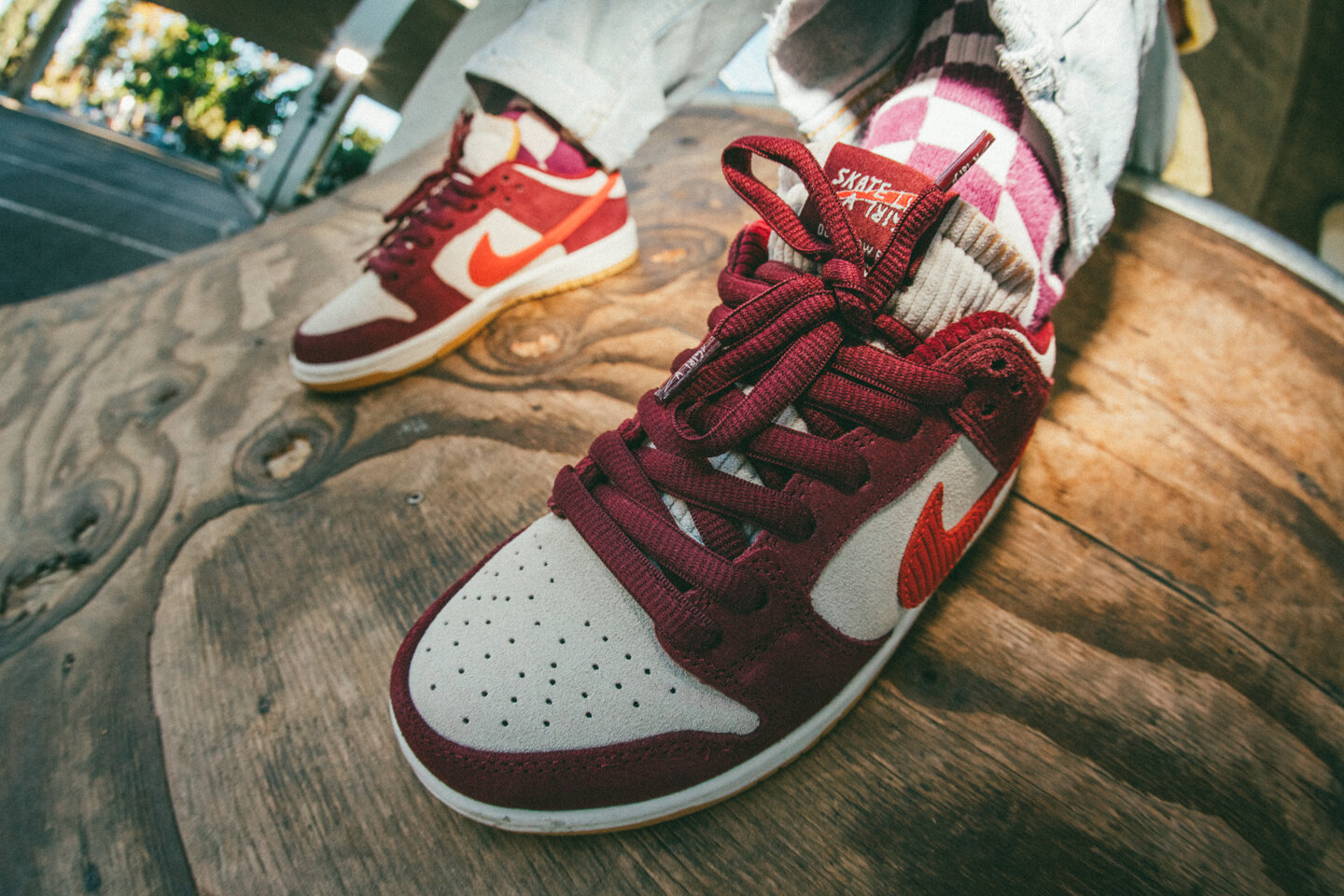
Can you talk a bit about the documentary you produced to coincide with the shoe release?
Kim: We’ve had a lot of promo videos that very much feel like commercials in a sense, which is great, but we never had a high-quality production around telling the actual story of someone within the program because that’s what it’s all about. We can sit around all day and talk about our programs and show our annual reports, but for someone to get it, they gotta walk in the shoes of someone whose life has literally been changed. With this doc, it’s featuring Alexa Berriochoa who is one of our leadership staff members who grew up in Utah in a very conservative environment, and then she came out as trans and stopped skating because she didn’t feel like there was a place for her. She’s so good at skating but she just quit because it didn’t feel possible and she felt that her safety was a concern. She found Skate Like a Girl and came to a session and her life was changed. It was literally the week before Wheels of Fortune, so she came to it and from there a pathway opened. Now she’s worked through different challenges, got involved, and is now a public advocate for the trans community. The video follows her personal journey, so it’s much more of a human story than, ‘We do things for skateboarding!’ Curator Pictures, who produced the doc, is a branch of Color which is a creative agency in Seattle who have been supporting us for a while. They donate a ton of their time, energy, and money to make our Giving Tuesday campaigns happen. Curator Pictures specifically is a network of female, LGBTQ+, non-binary, and BIPOC directors who create inclusive environments with their productions, which is really cool because that industry is very male-dominated so there are a lot of similarities with Skate Like a Girl. It was about a year and a half of trying to make it happen. I’m really excited to see it all come together.
Looking back at the progress Skate Like a Girl has made over 20 years, where would you like to see it go over the next 20?
Kristin: I want it to feel more sustainable. I want more of the skate industry, pro skaters, and people to start to open their eyes to see the benefit of skateboarding—not being a cool popularity contest and be more about how skateboarding was when we first started. Something for freaks and geeks. I would hope that we can continue to influence the culture to be more inclusive.
But really, I don't want to know where Skate Like a Girl's going, because I'm getting old I'm a white person. You know what I mean? I want people to be able to influence the work that we do and for them to speak up and share their experiences that are different than mine. I want to open the door for those people the way Skate Like a Girl opened the door for me.
Is it fair to say that Skate Like a Girl is more of a toolset? Giving people those tools to go create what they want and need, respectfully of course.
Kristin: Yeah. I want to be part of the canvas that helps other people create shit. We're kind of like a library, I guess and I want to be a resource for anybody that wants to make their dreams come true.
How can people support Skate Like a Girl?
Kristin: You can volunteer, you can donate, you can follow us on Instagram, and you can buy a pair of Dunks! But honestly, start your own project! Any way to buy into the commitment to make sure that skateboarding for everybody is important to me. Whatever that means to you.
Kim: I agree with that. If you're a fan of what we're doing take that on and like do your own version of it because that's going to further the movement. Donating is great, but taking your own initiative is the end goal. As Kristin said, she doesn’t know where it’s going to go. We always joke and say we hope to [not?] have jobs in the future. If we could get there… if anyone could show up to any skate space and feel included and not feel like they need a special session to make them feel included, that’s the goal. If you create enough equity, then you can get to that place of equality someday.
